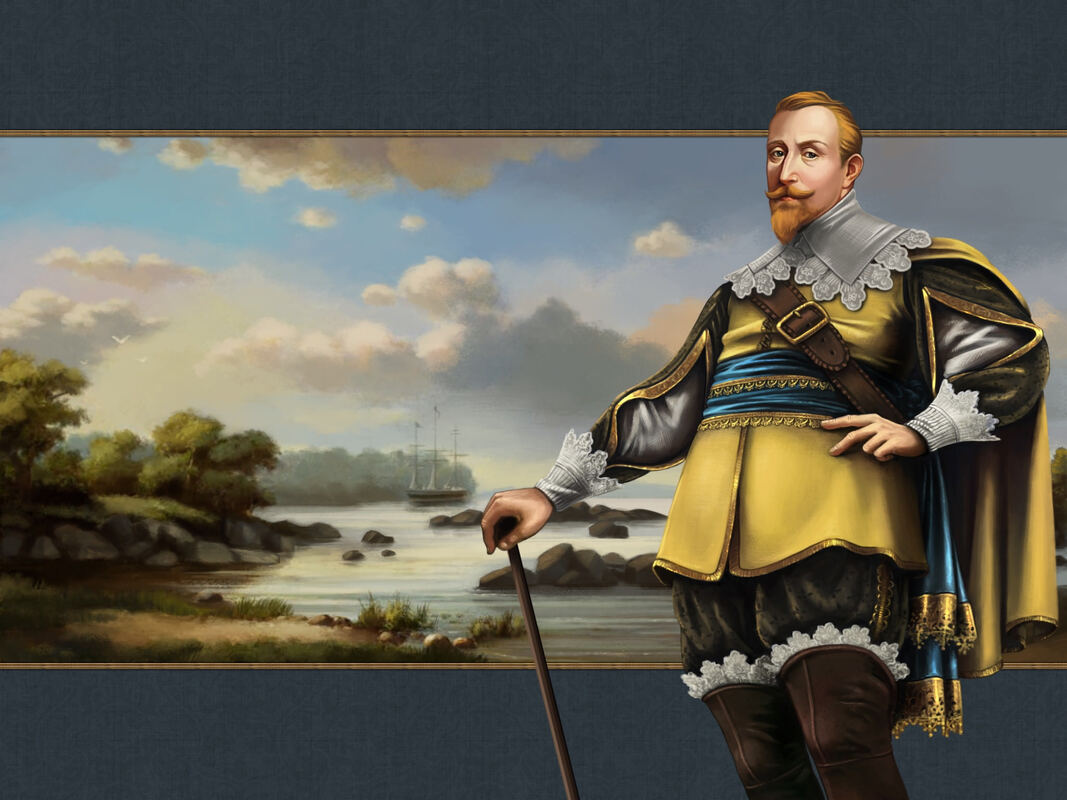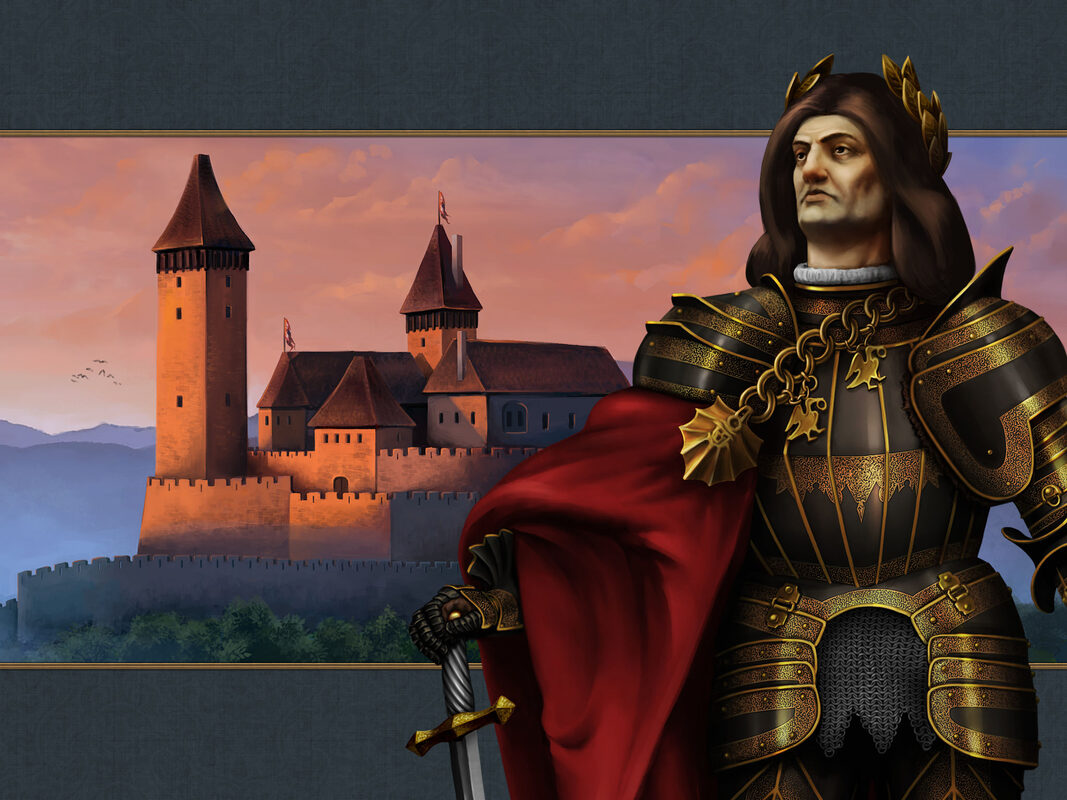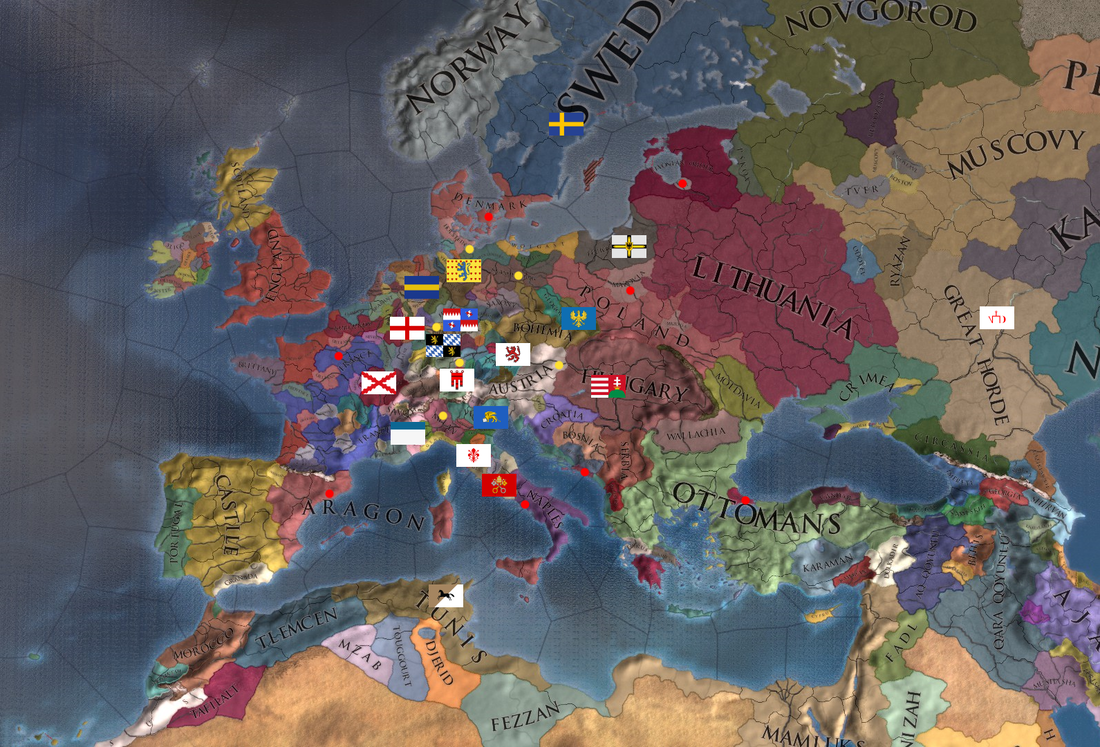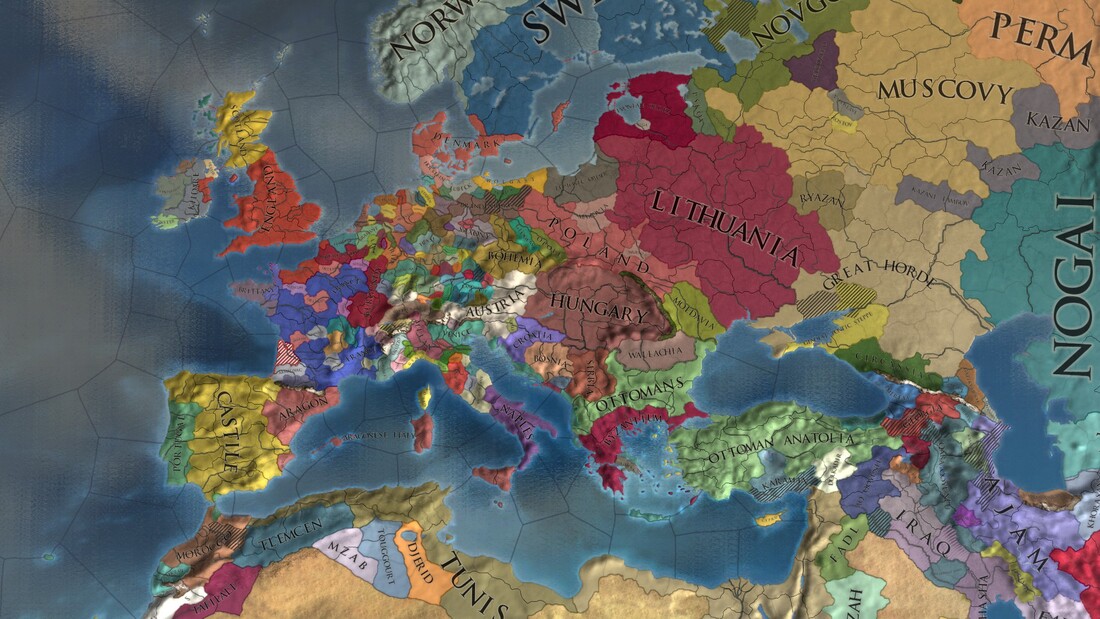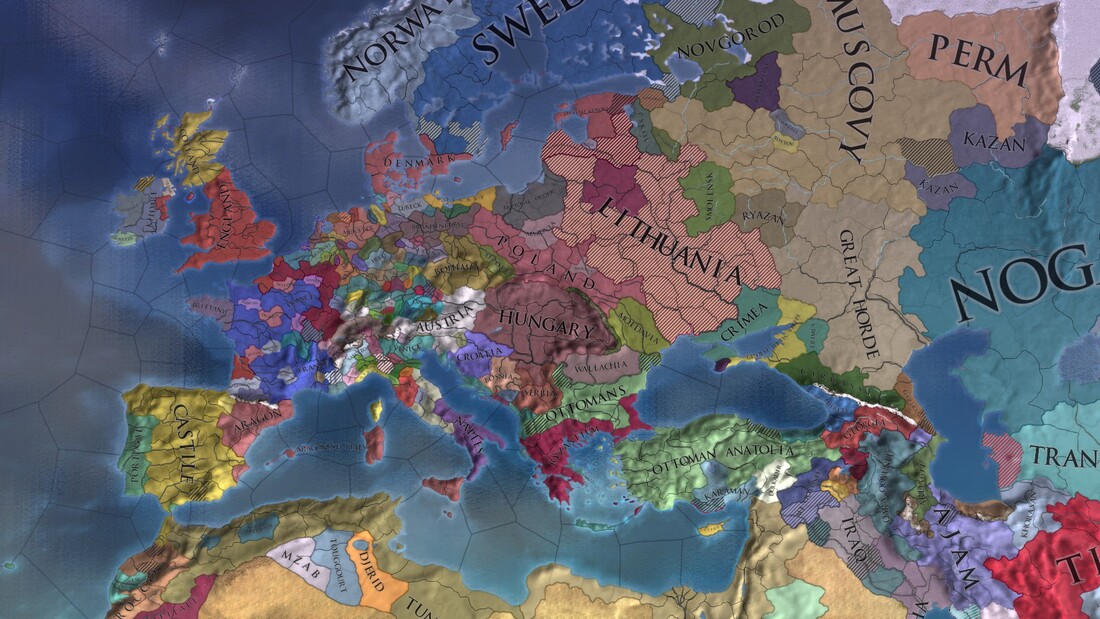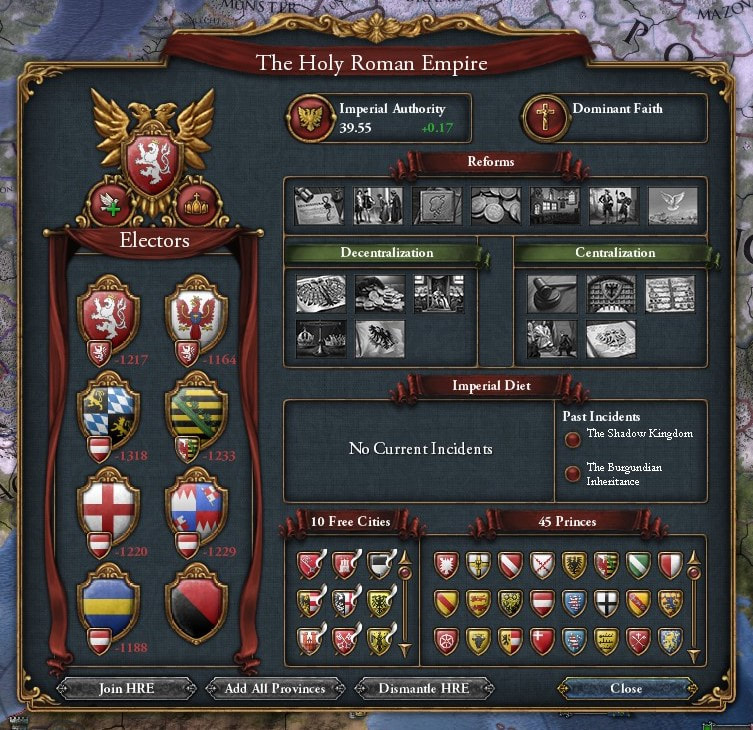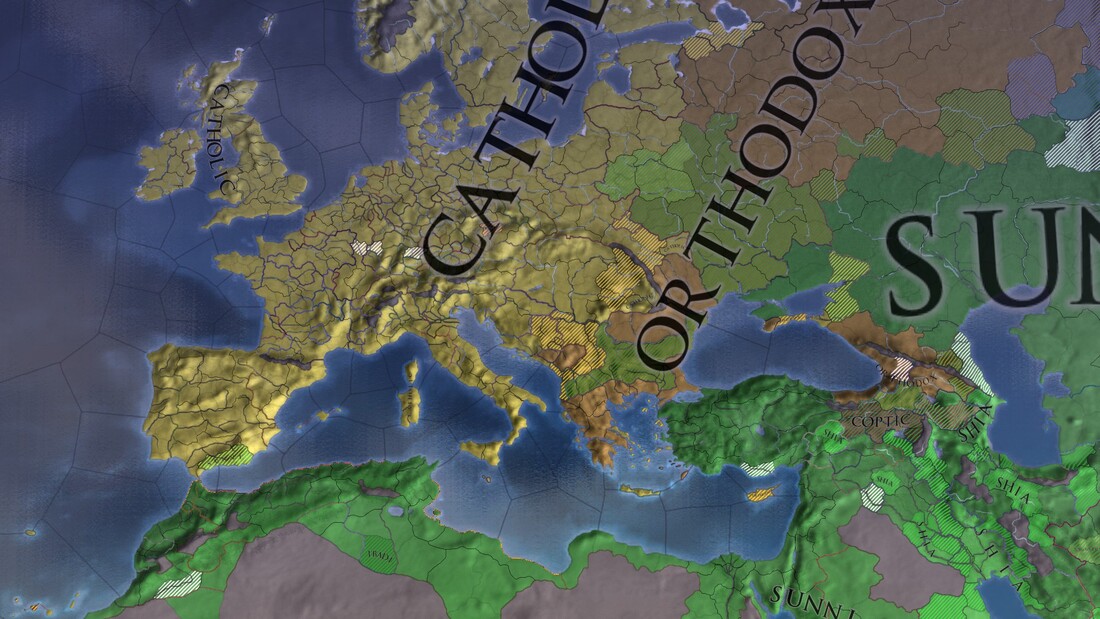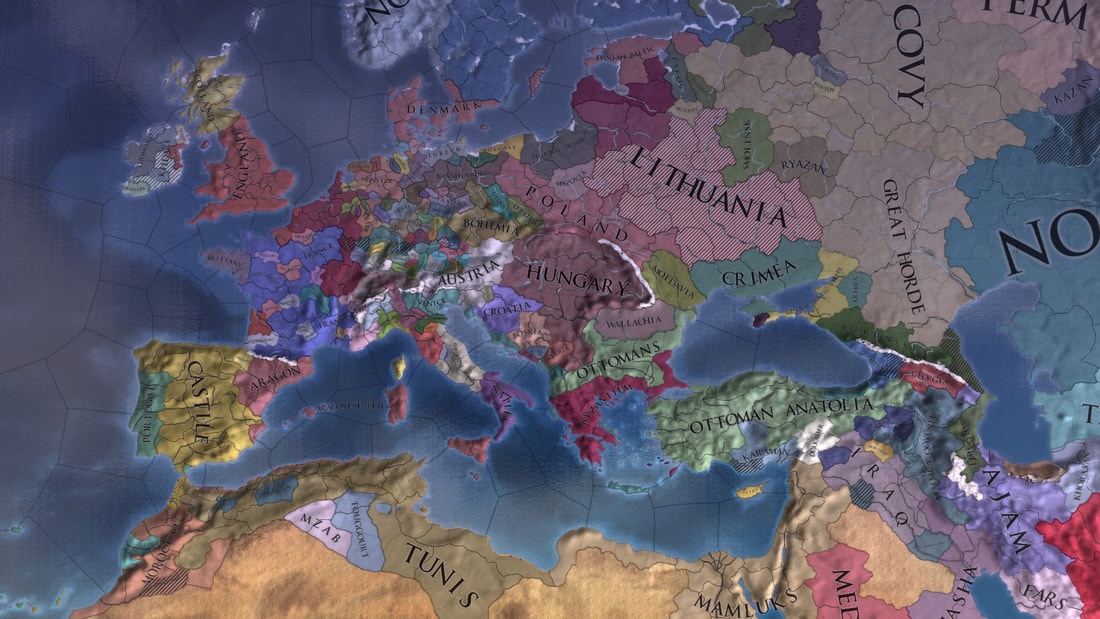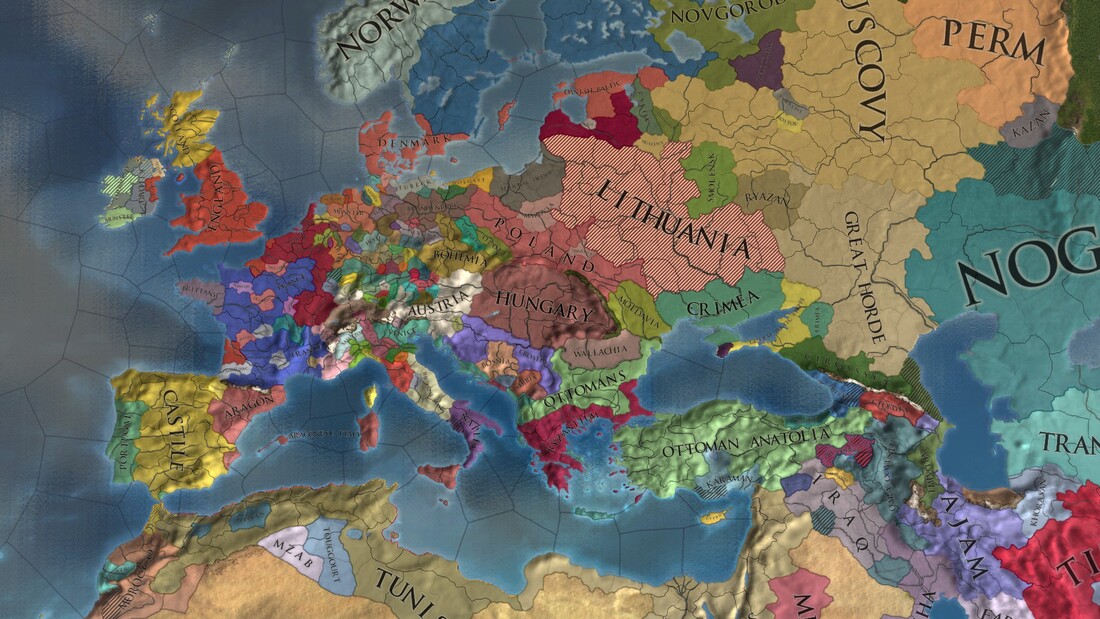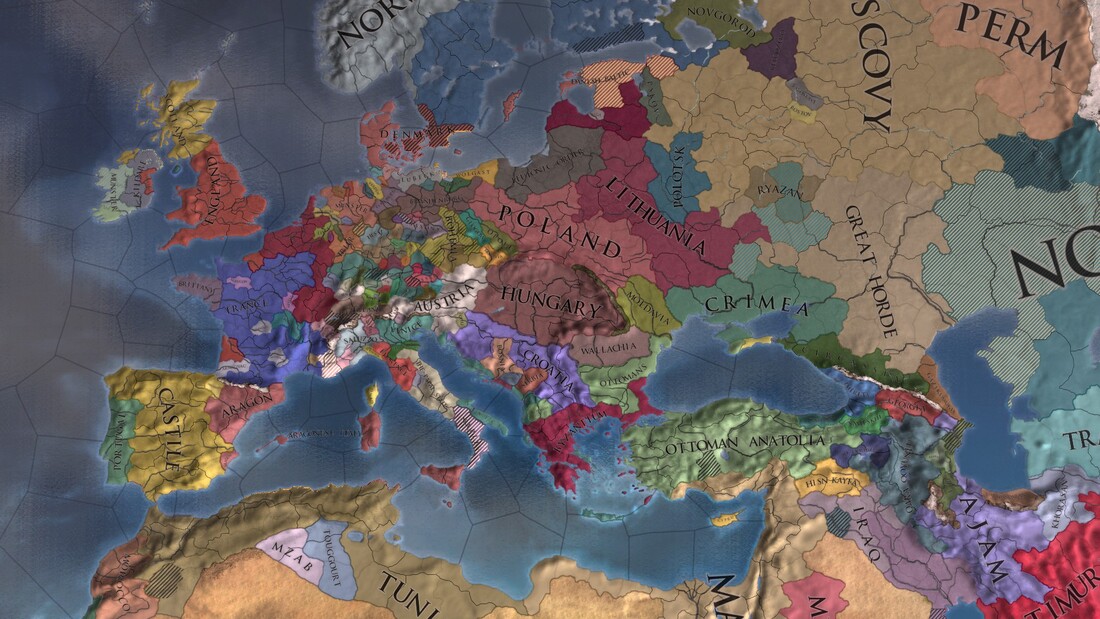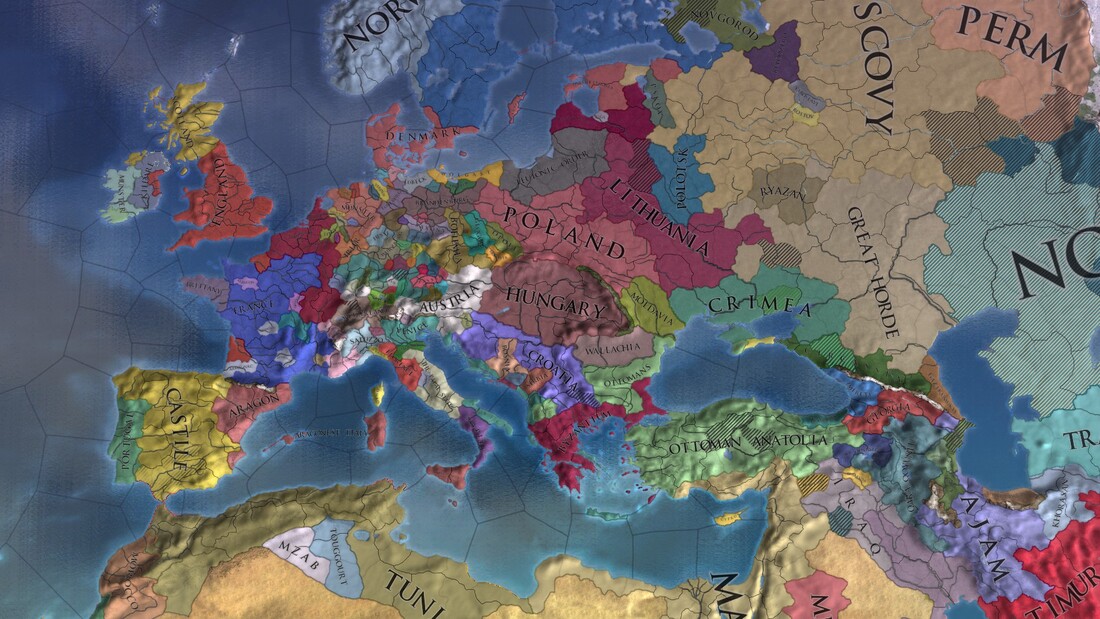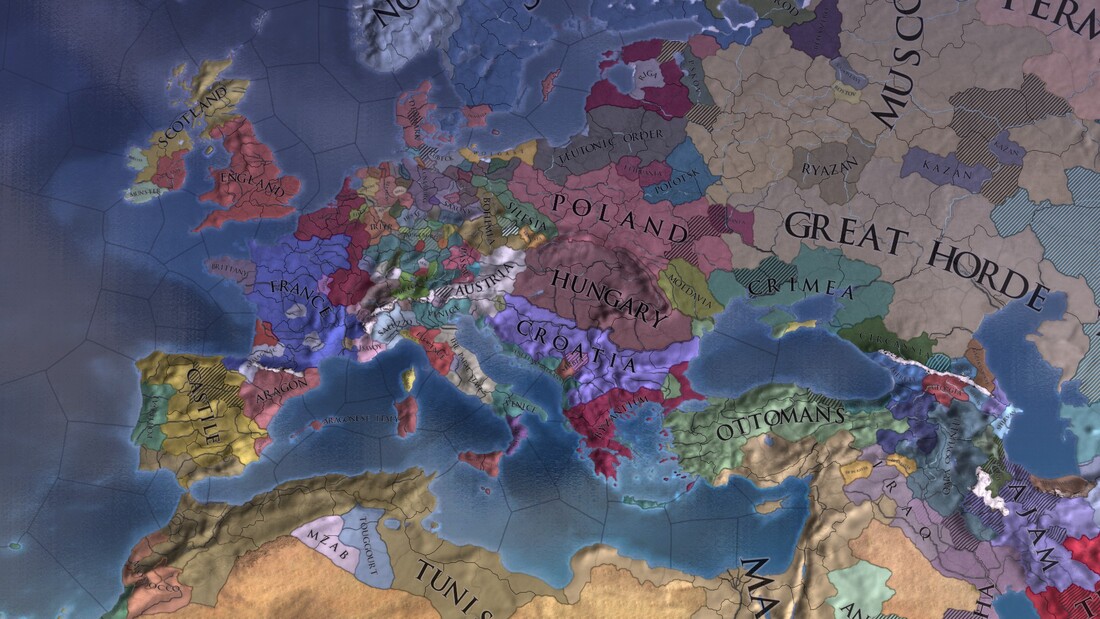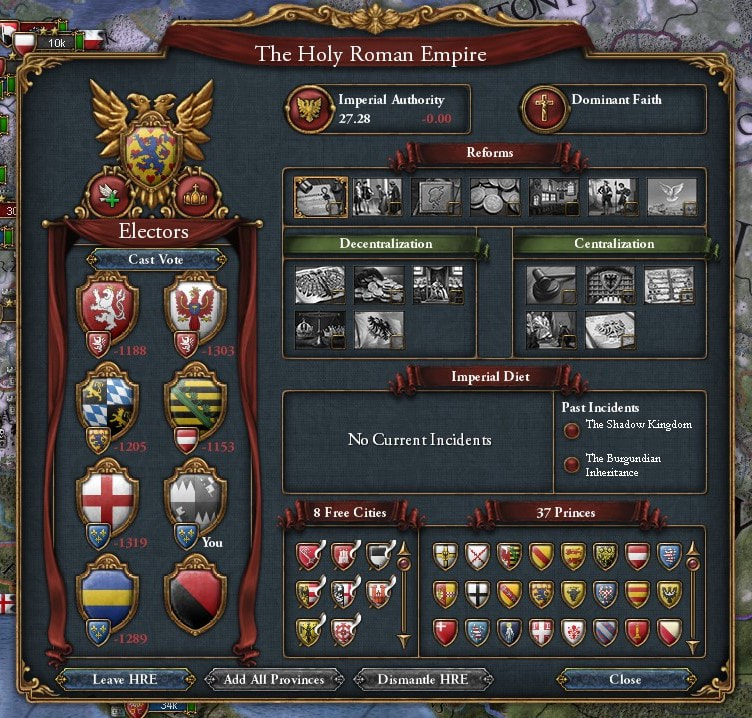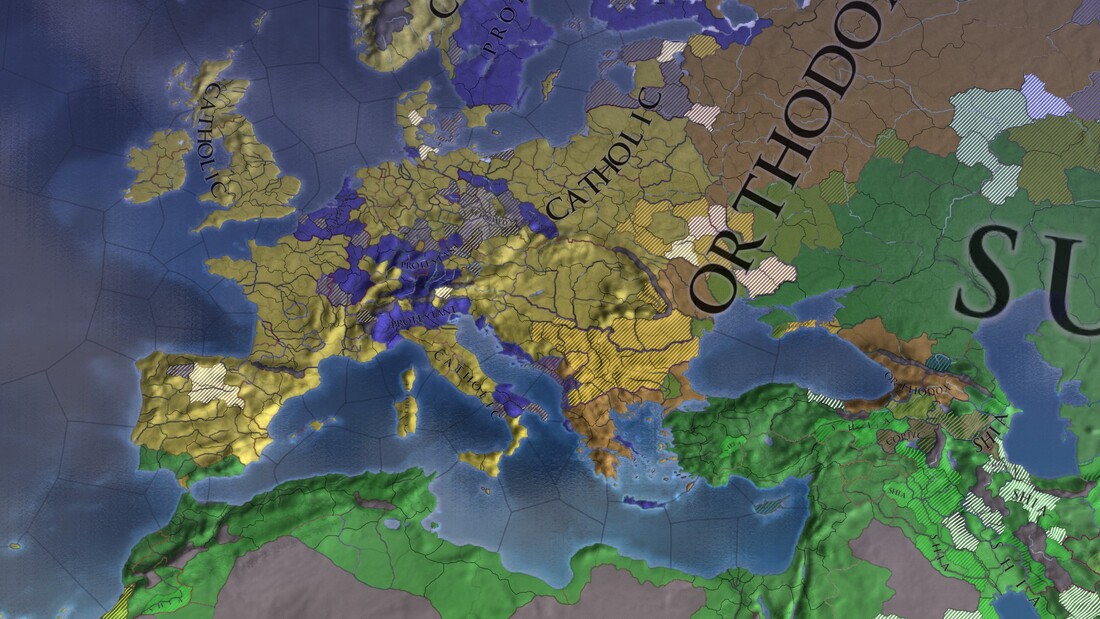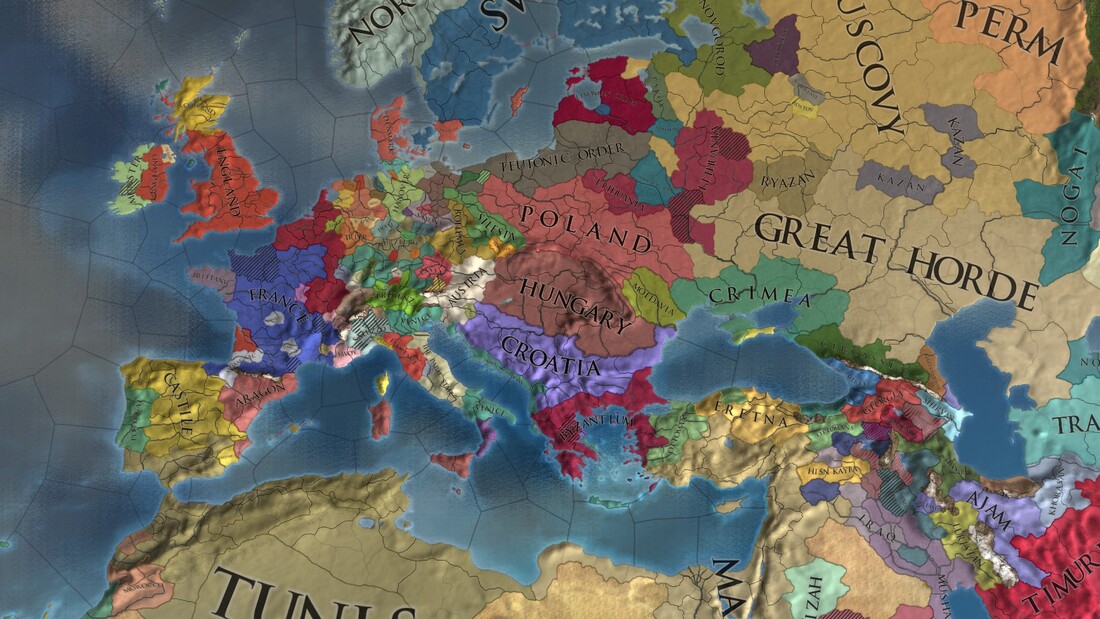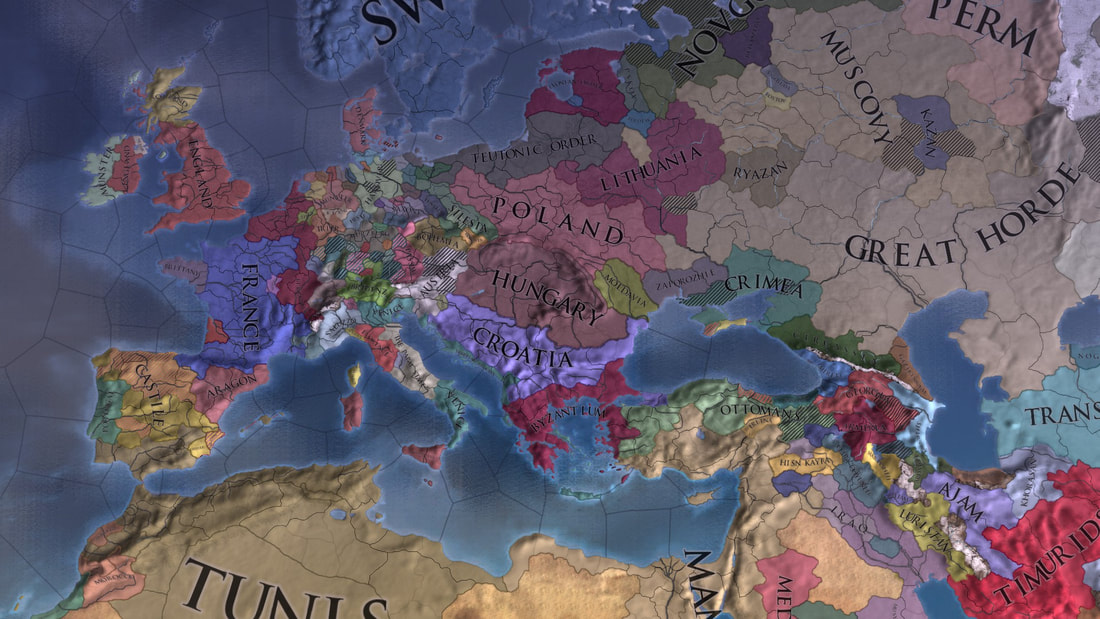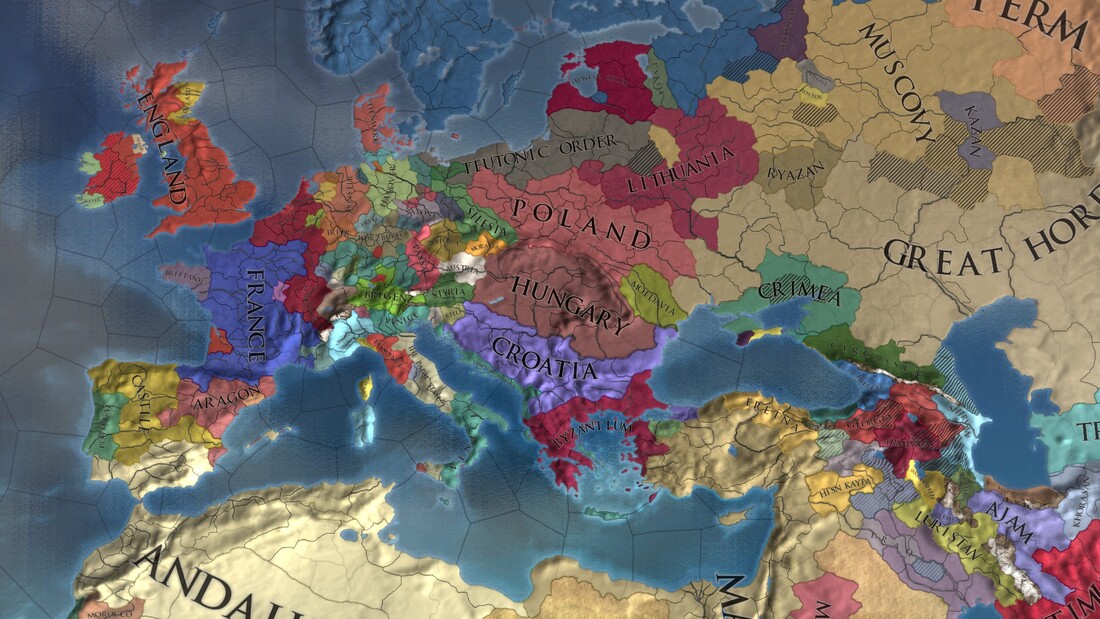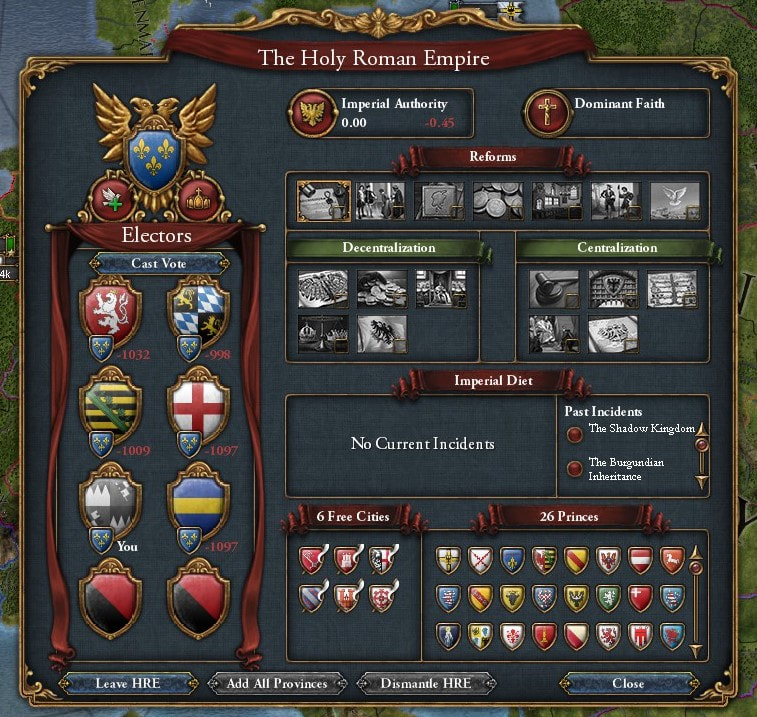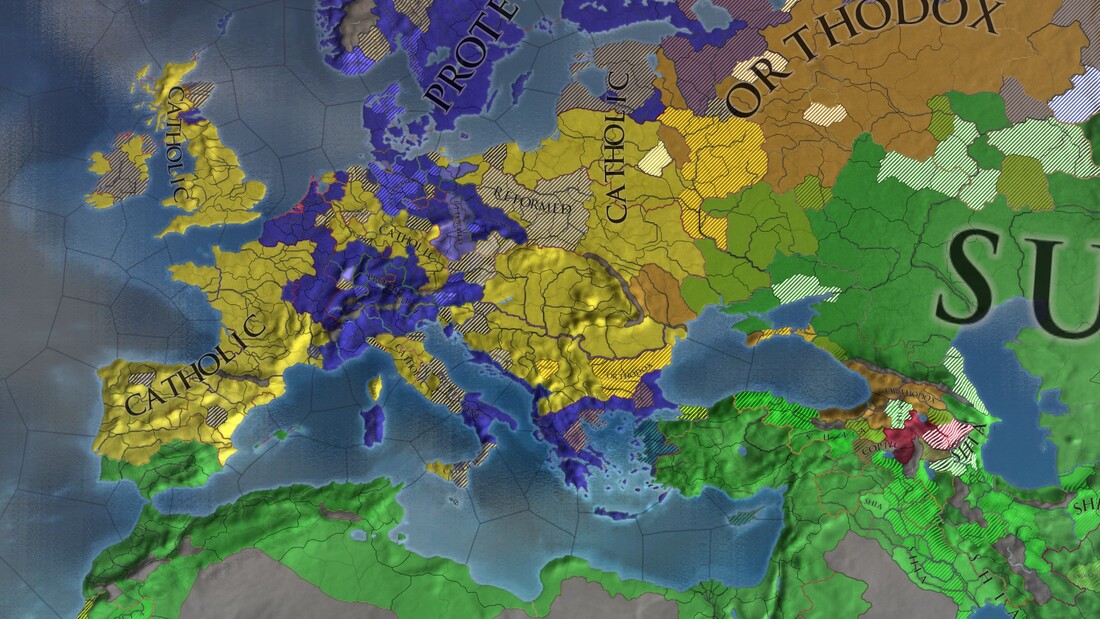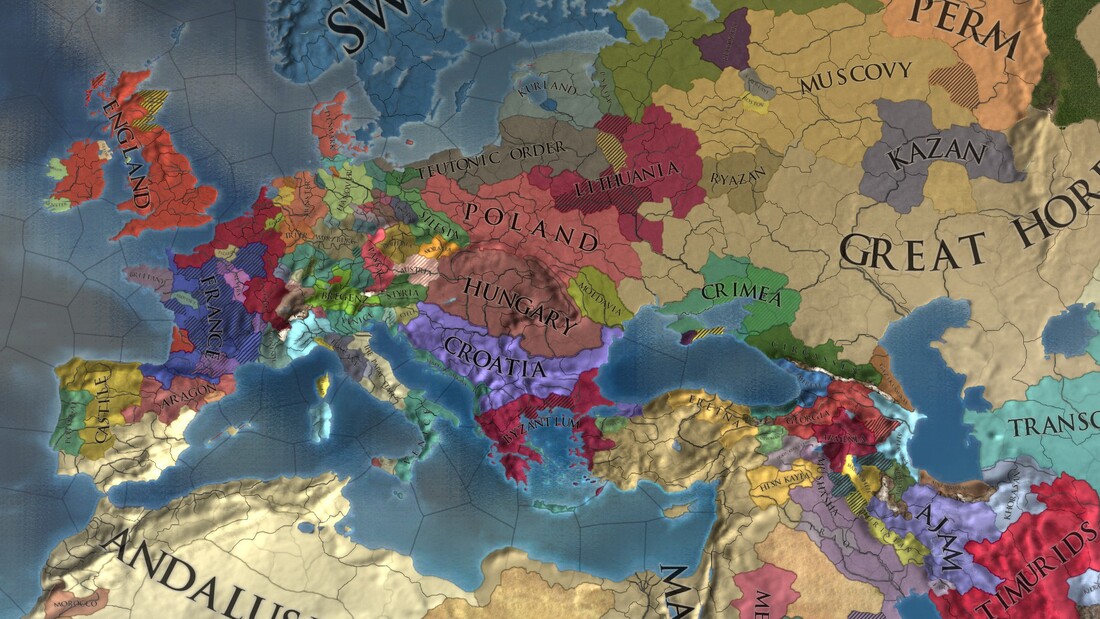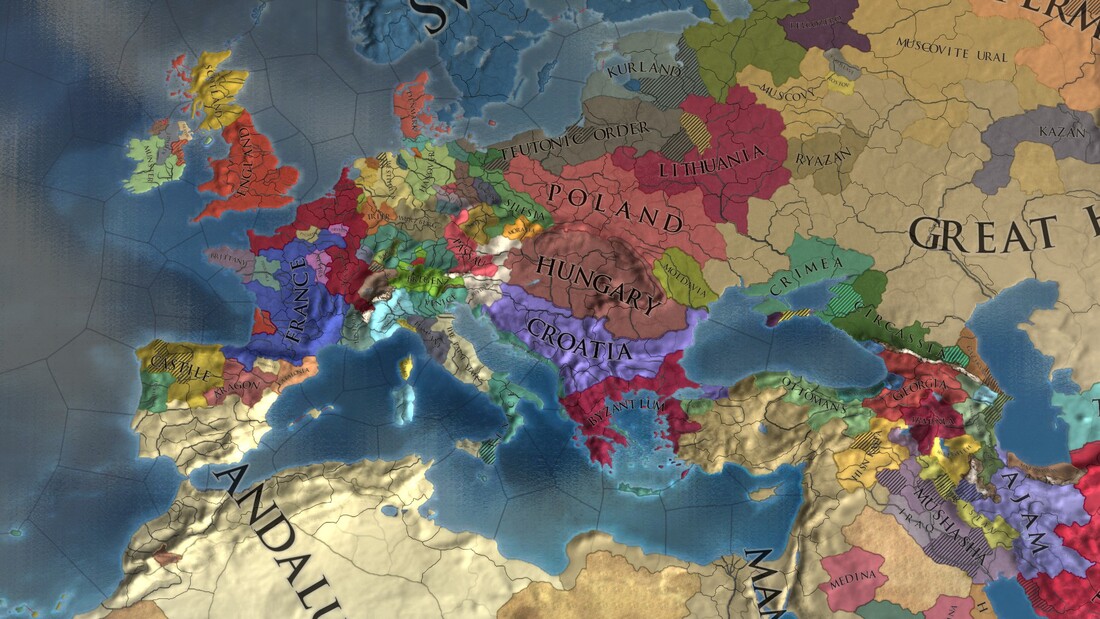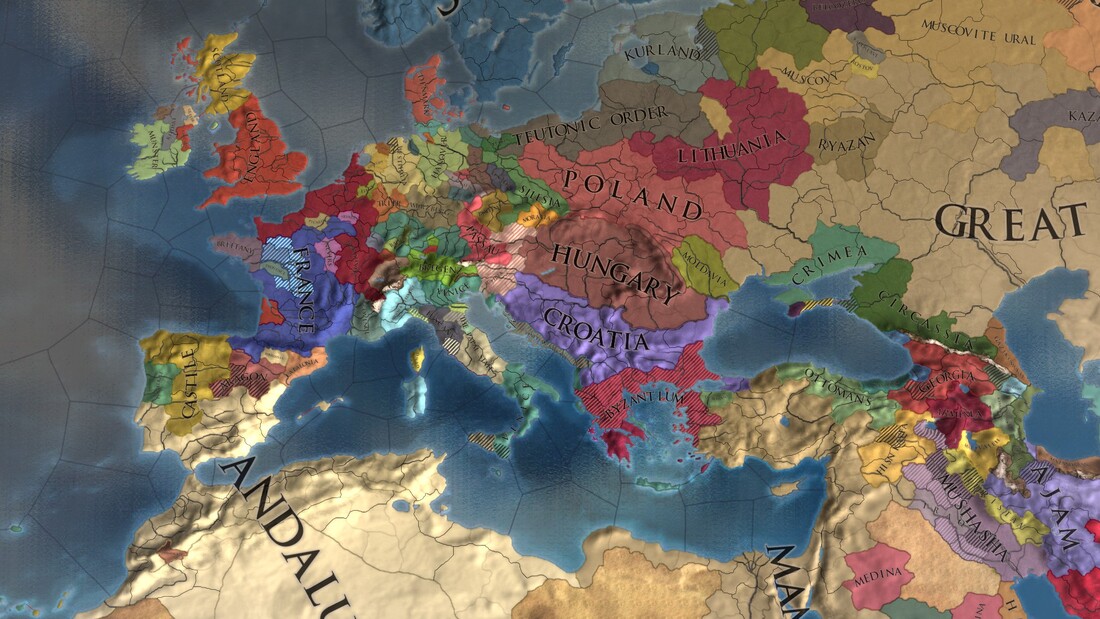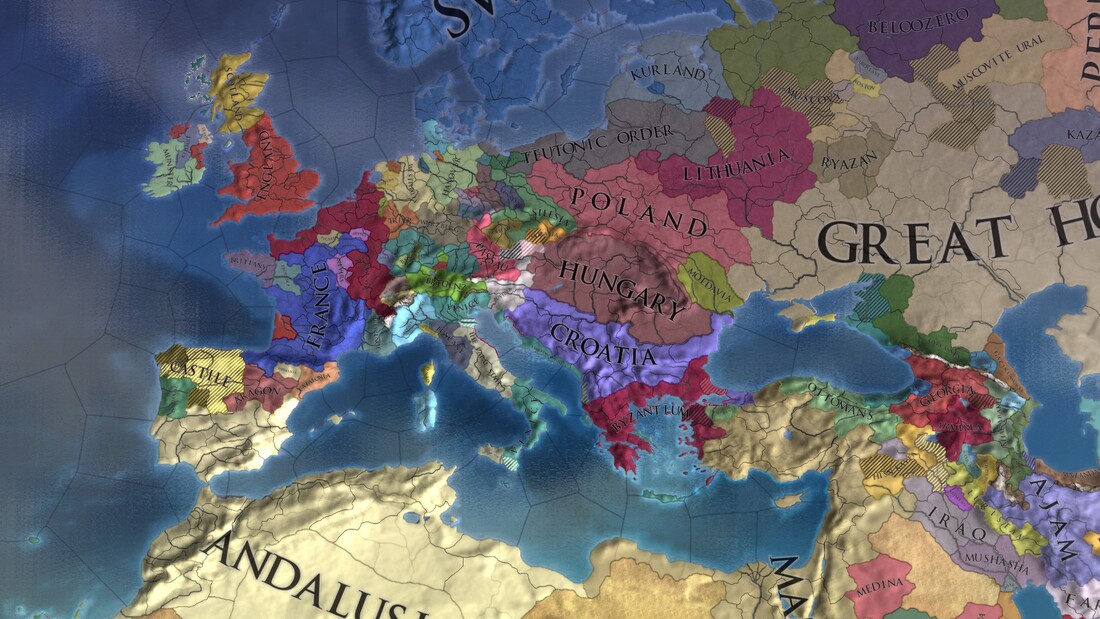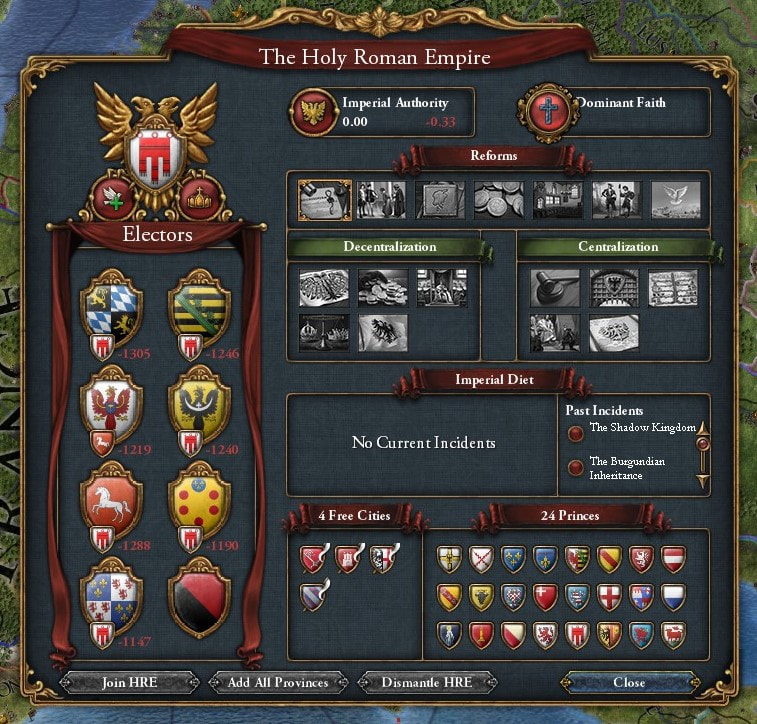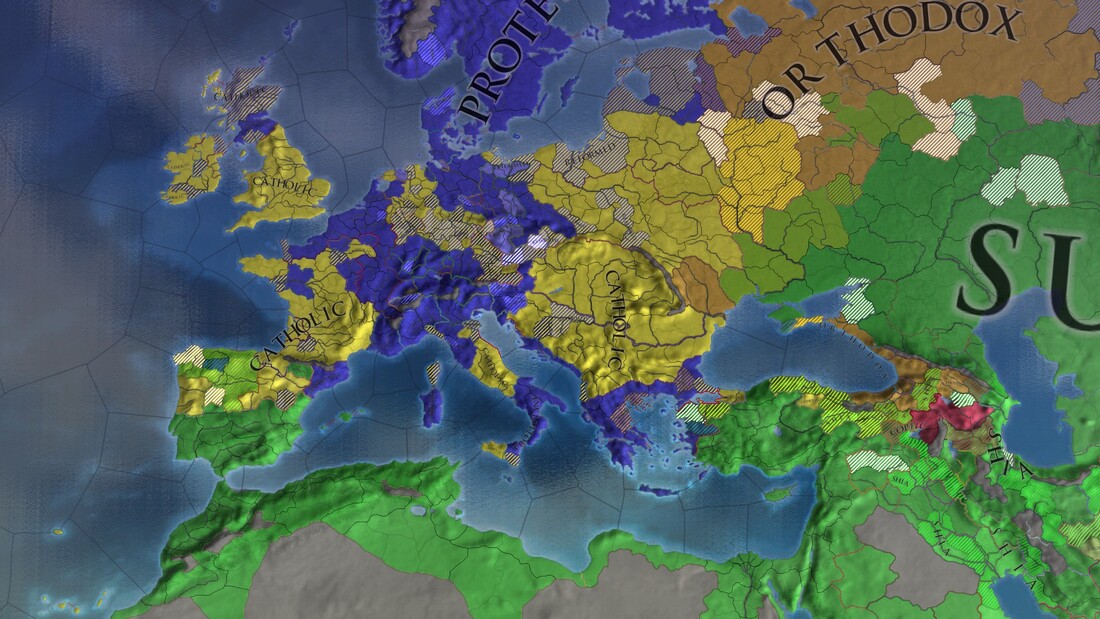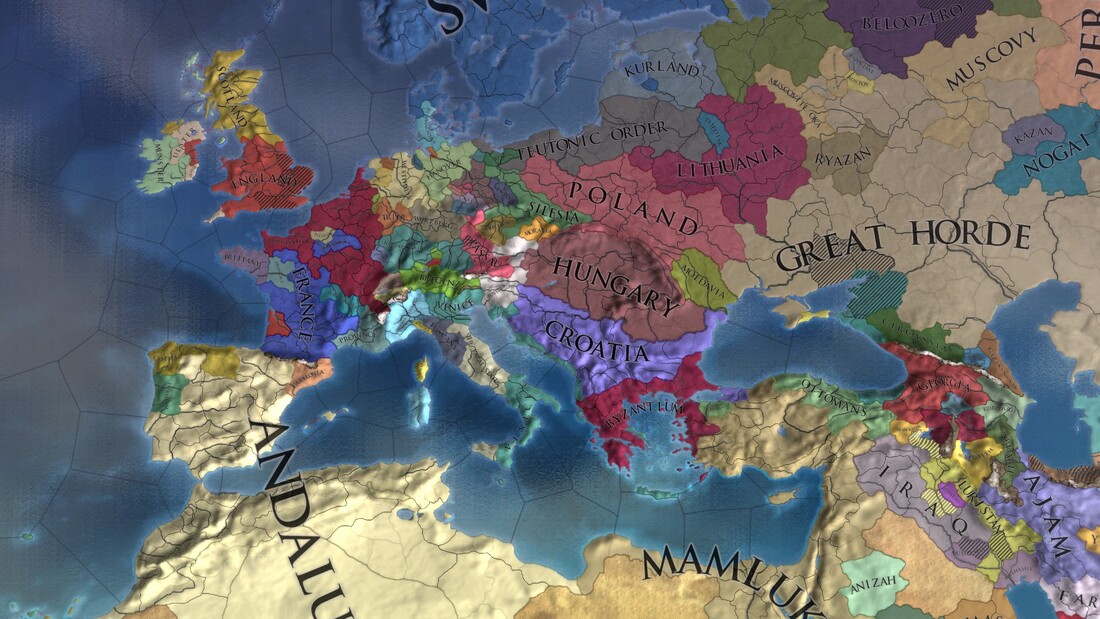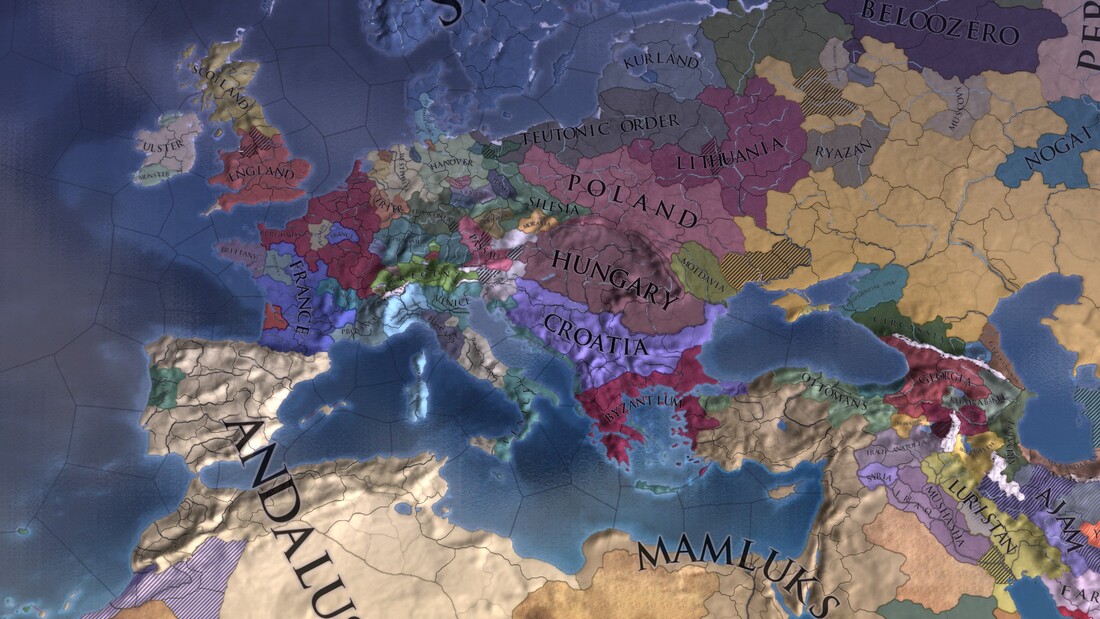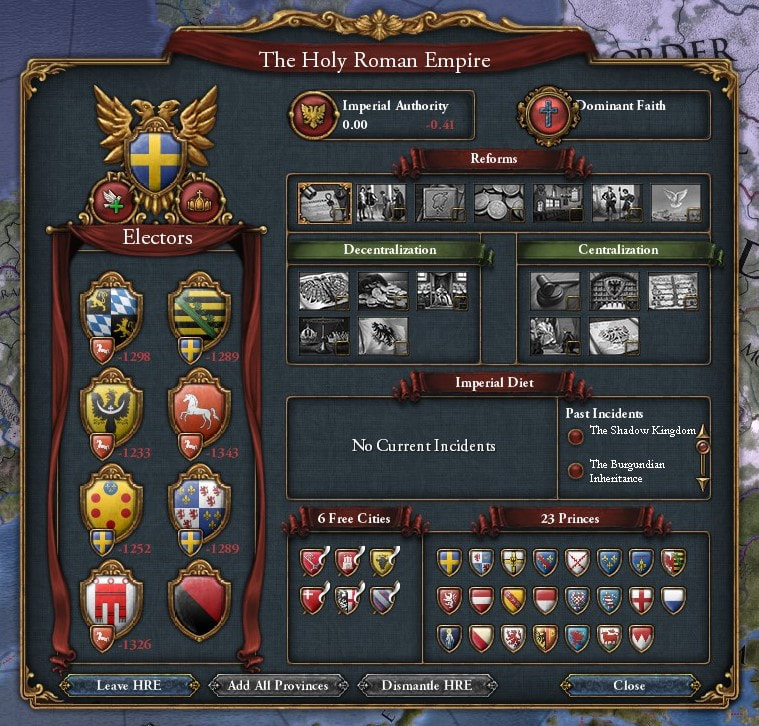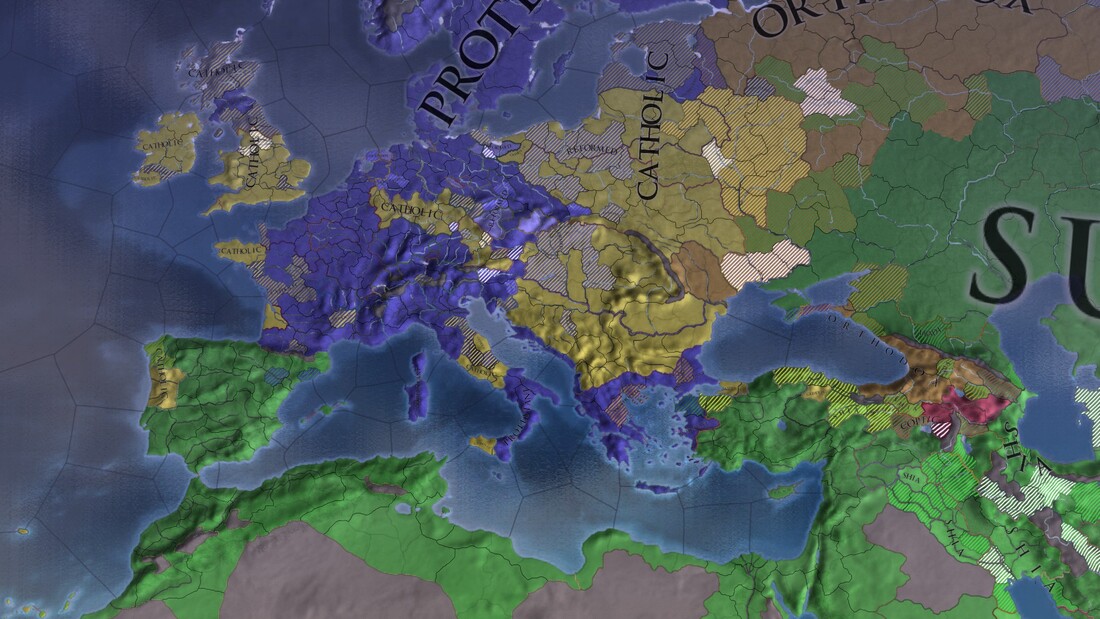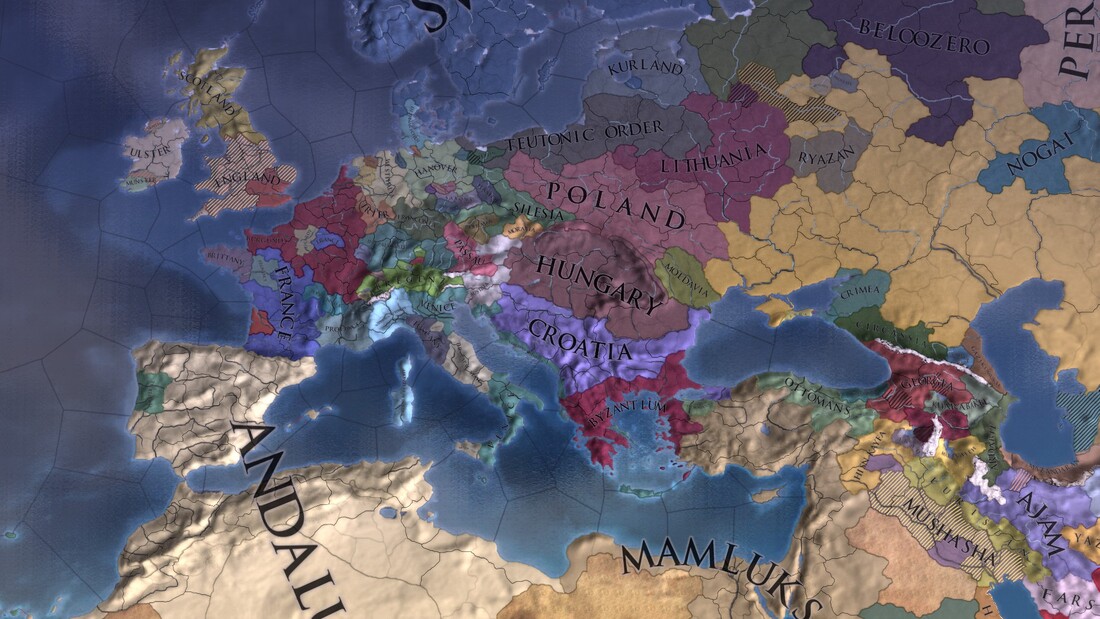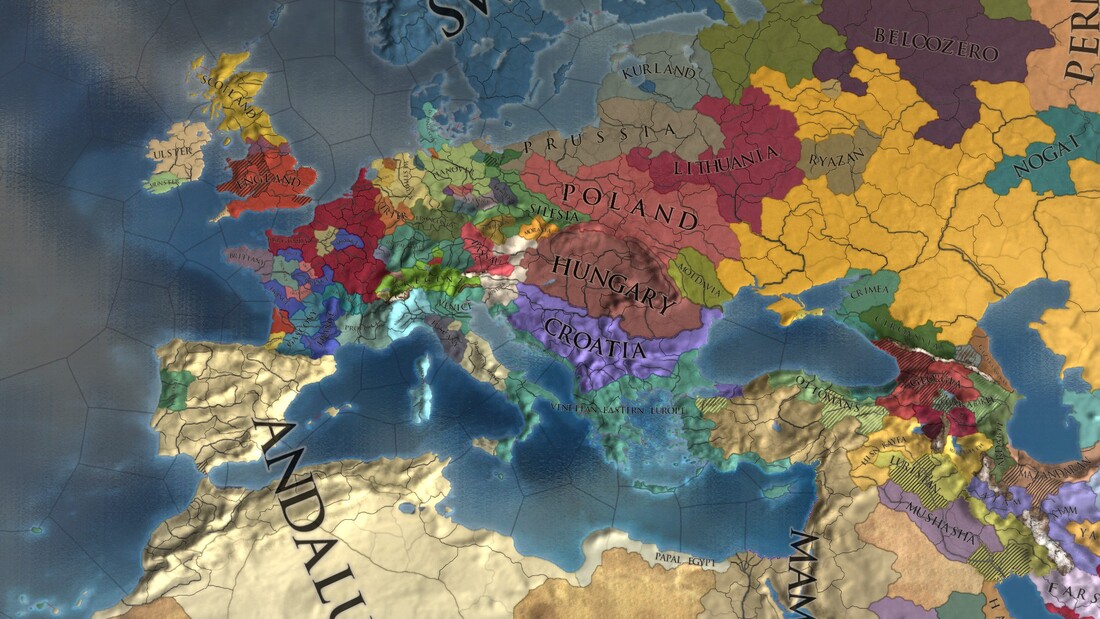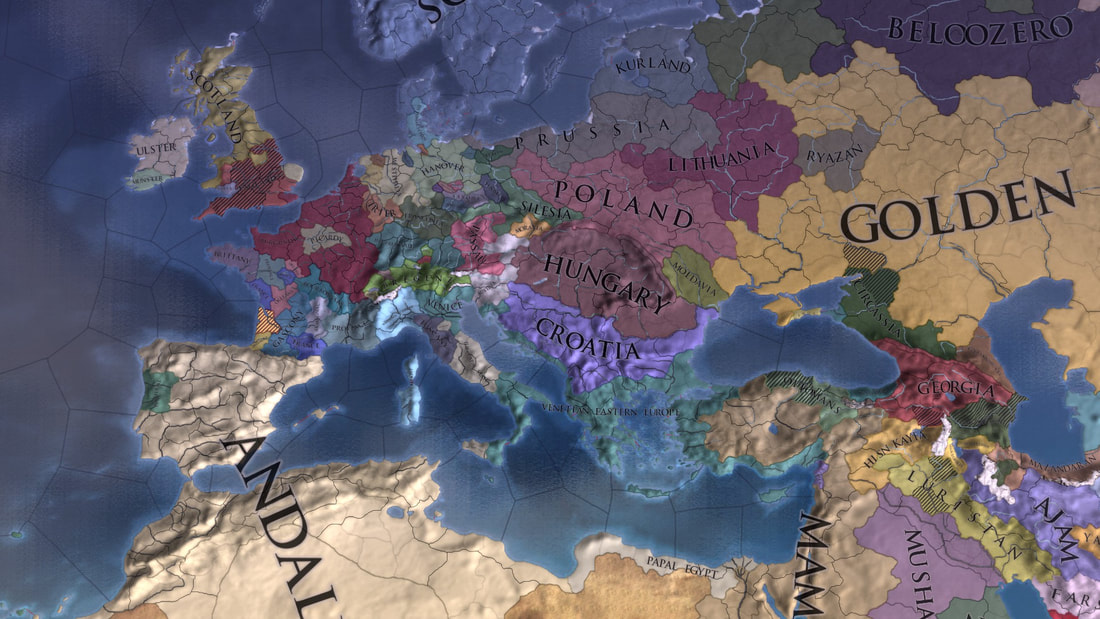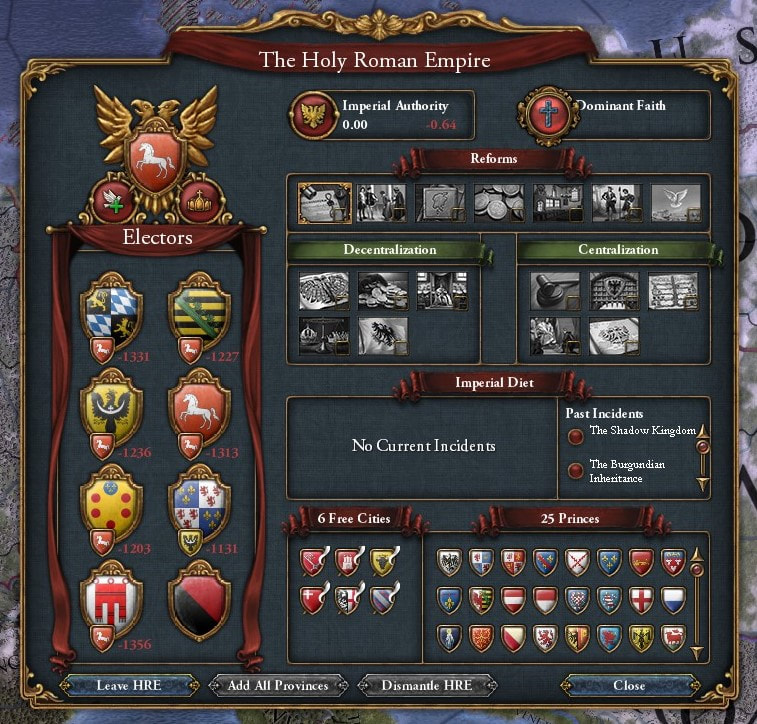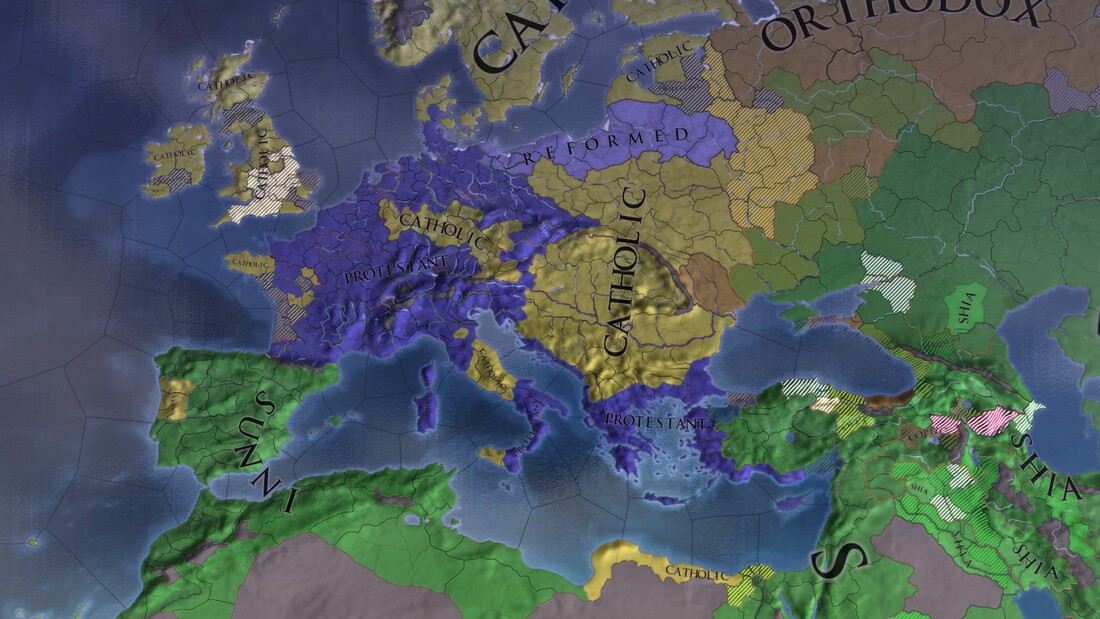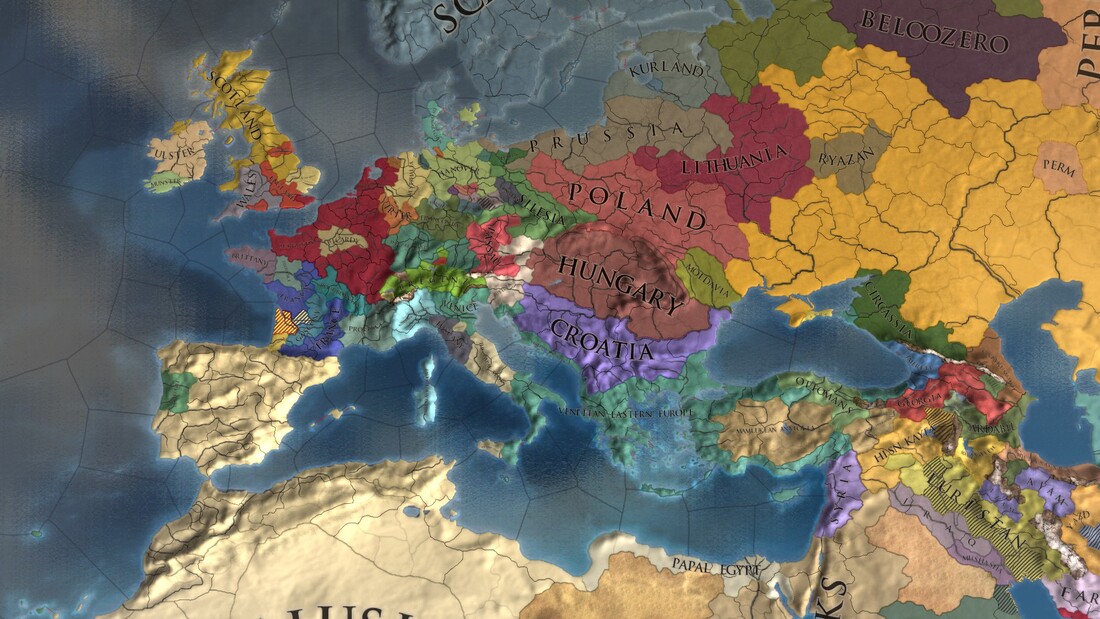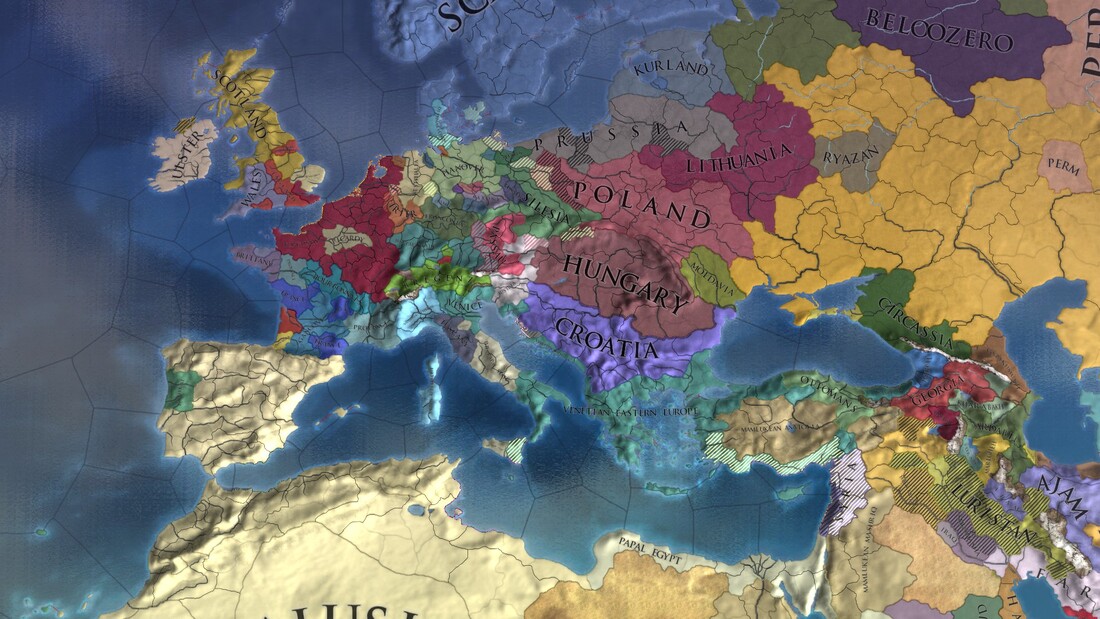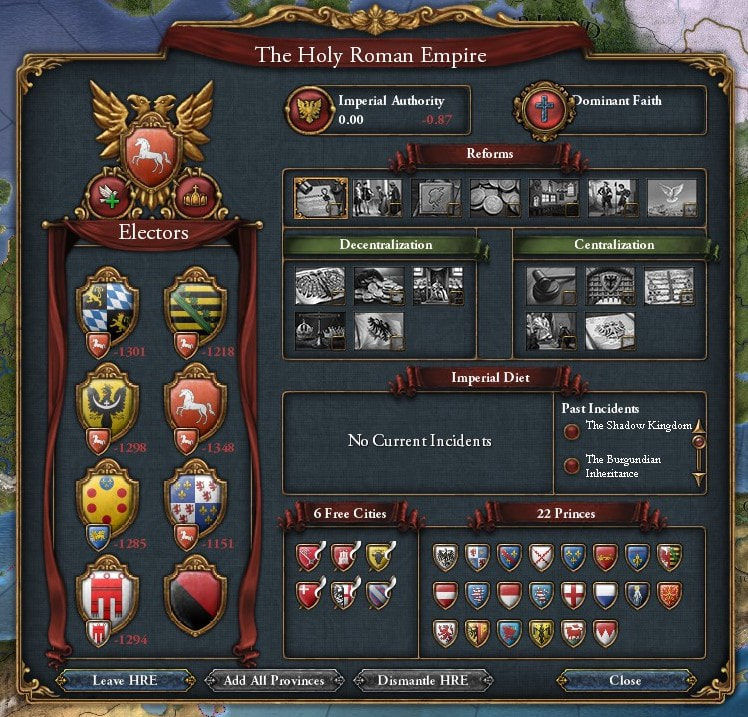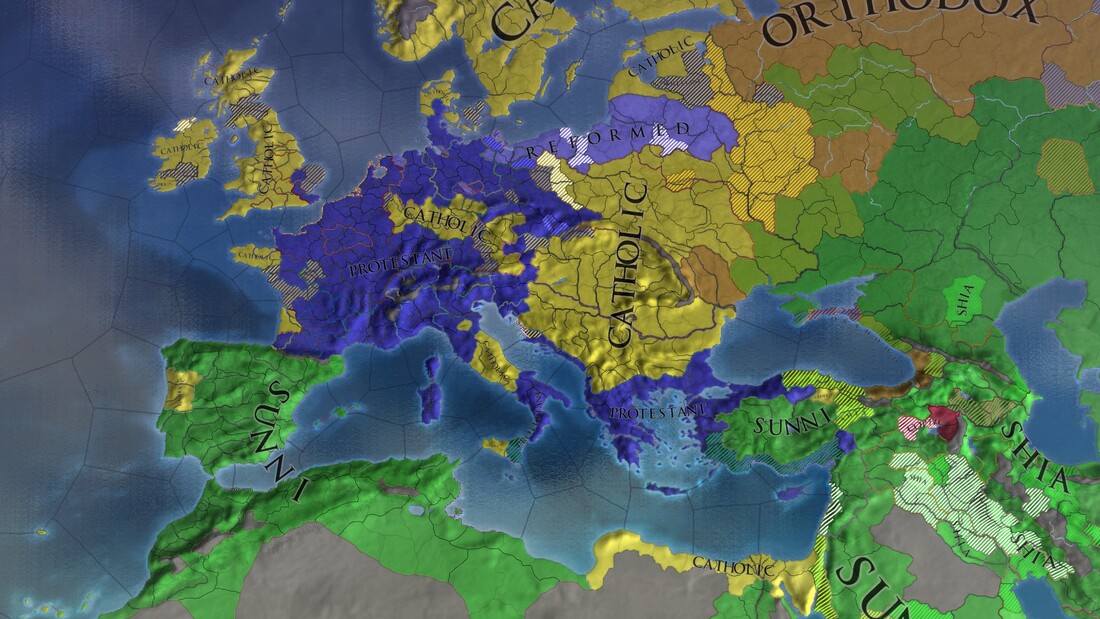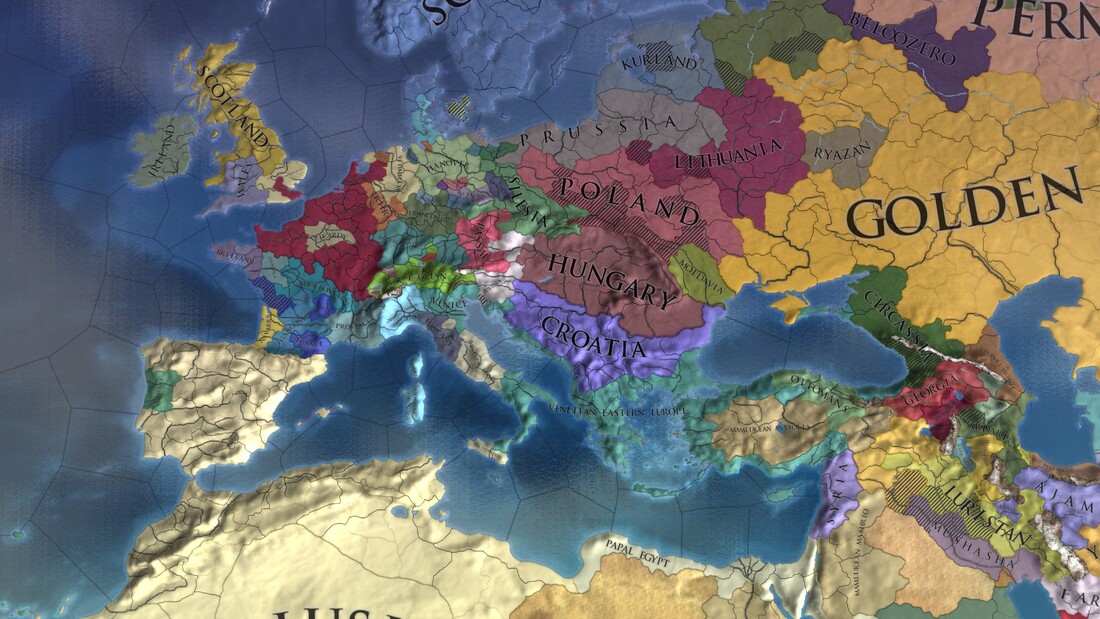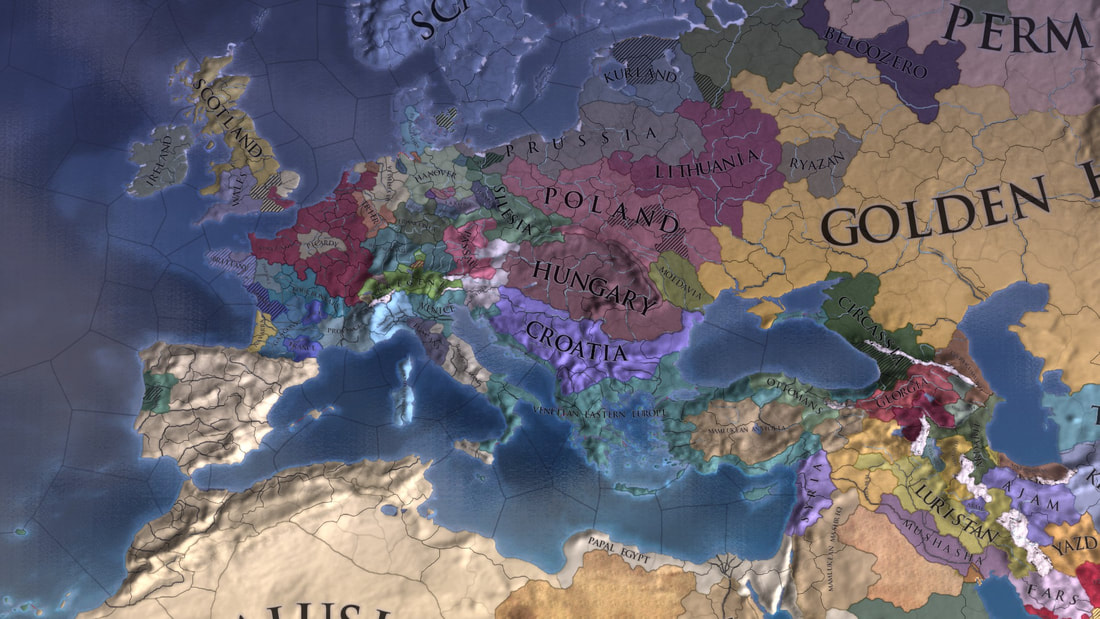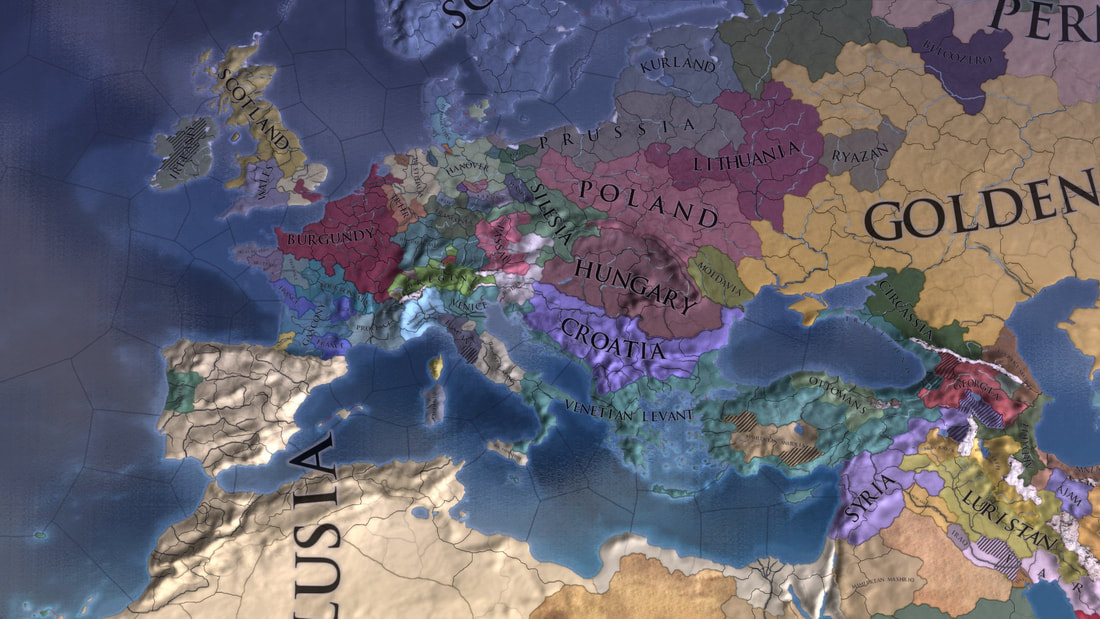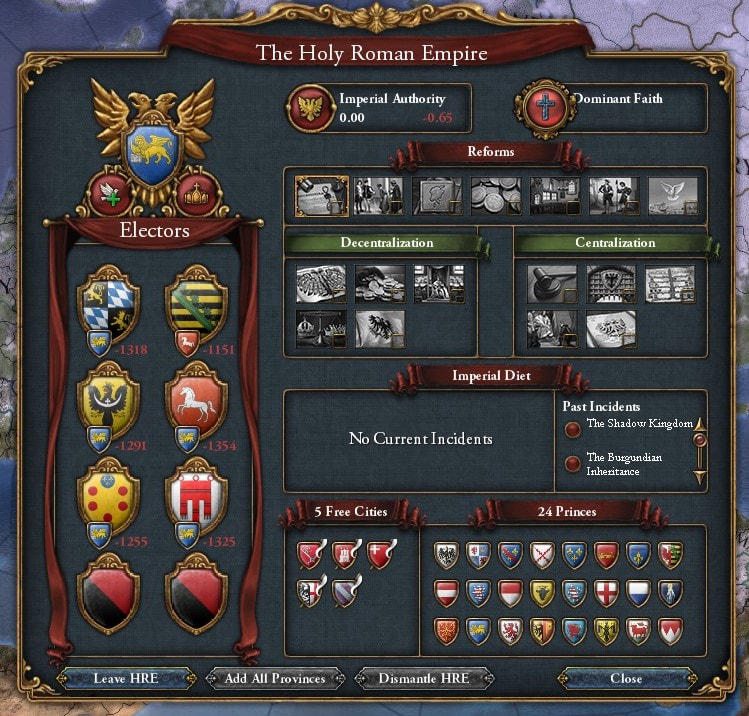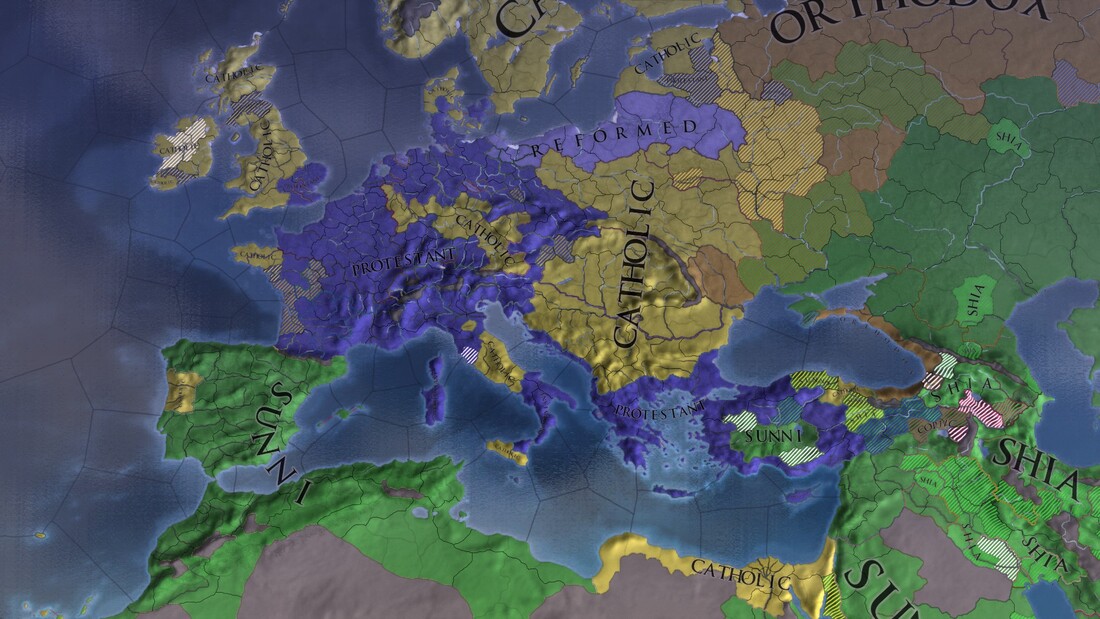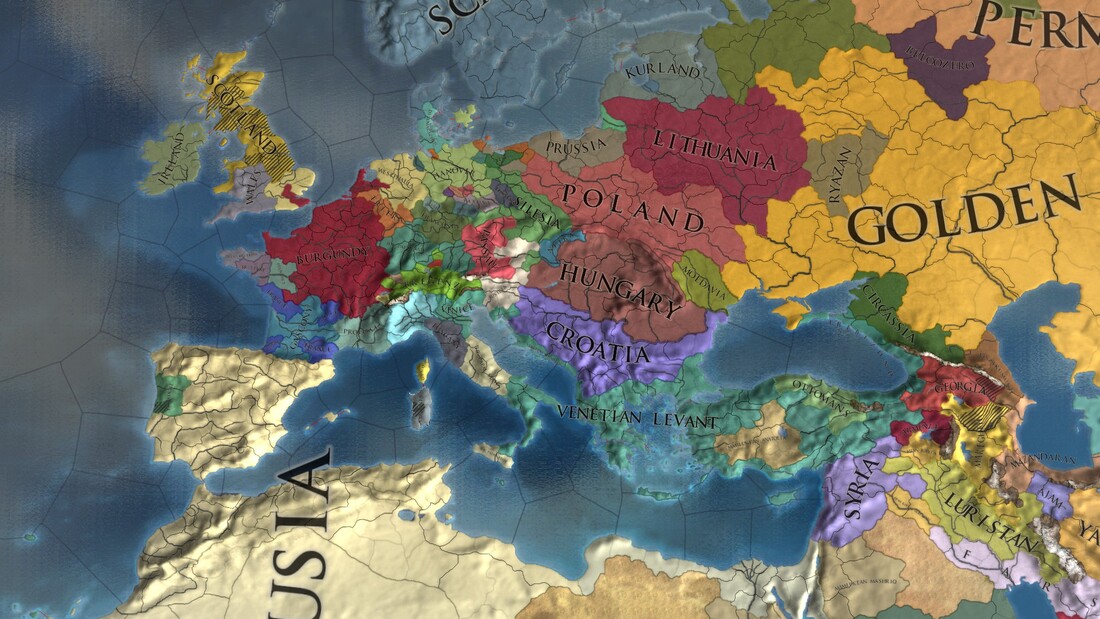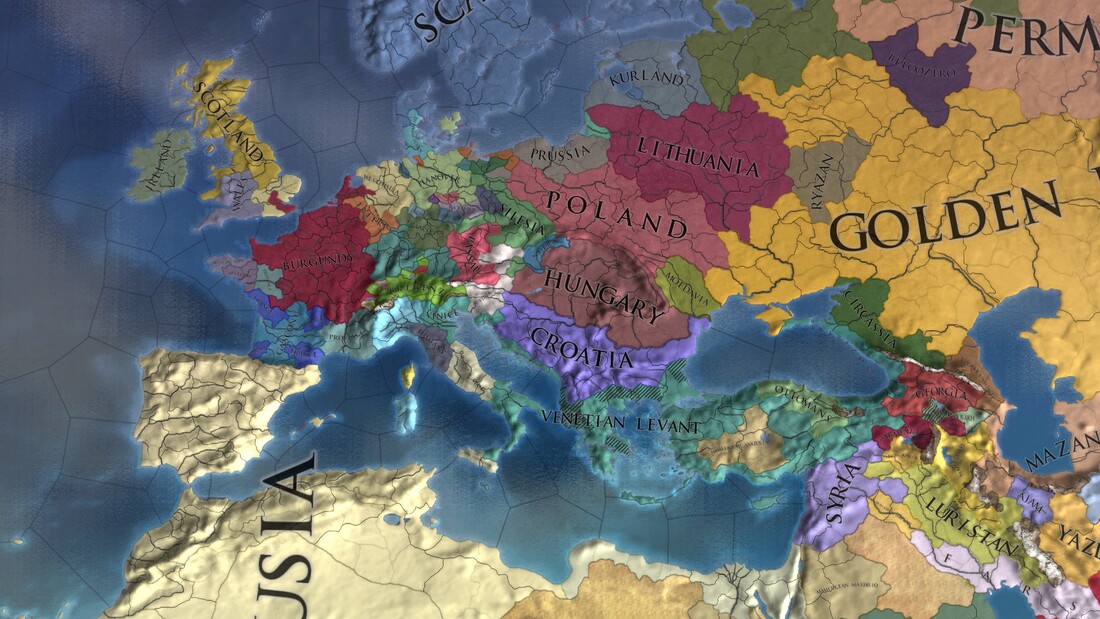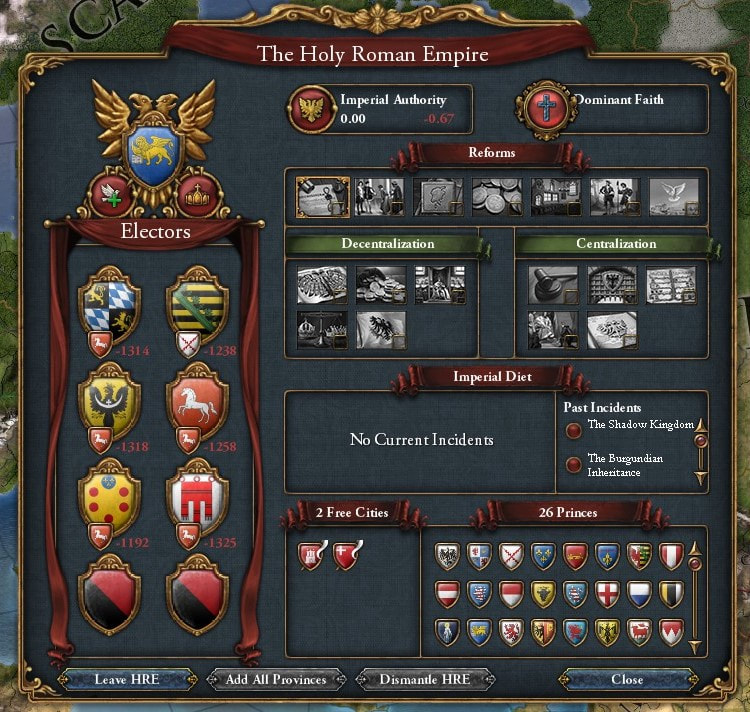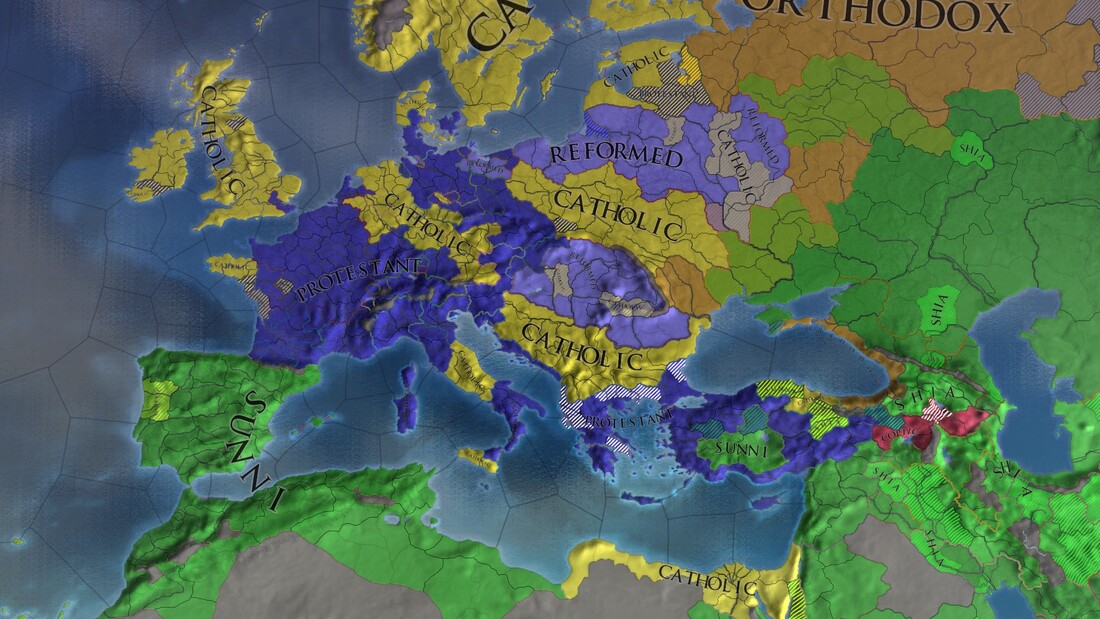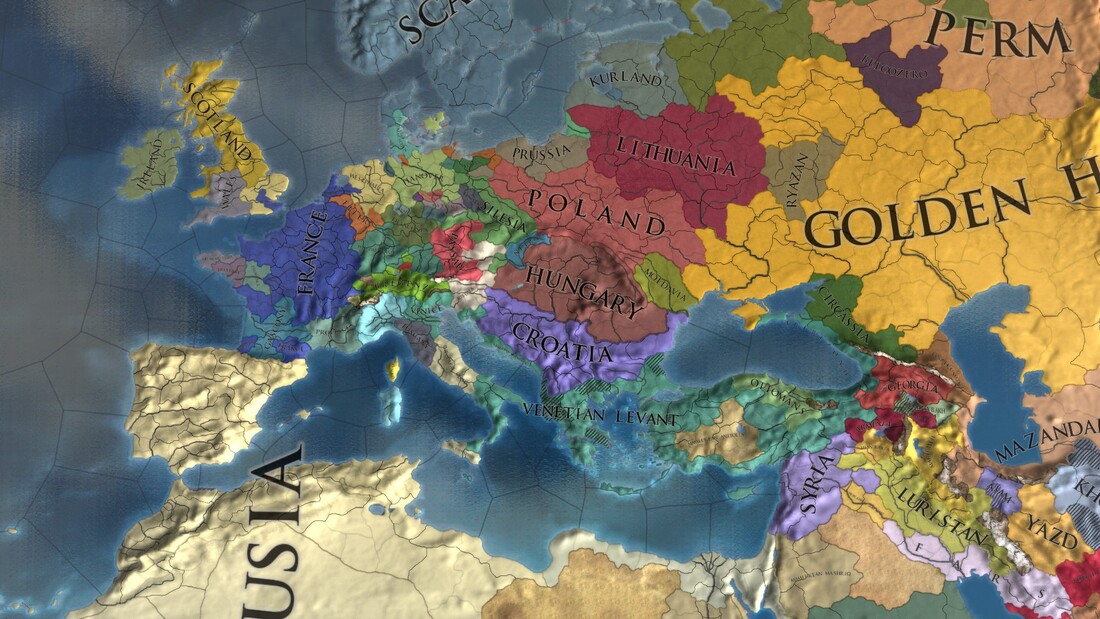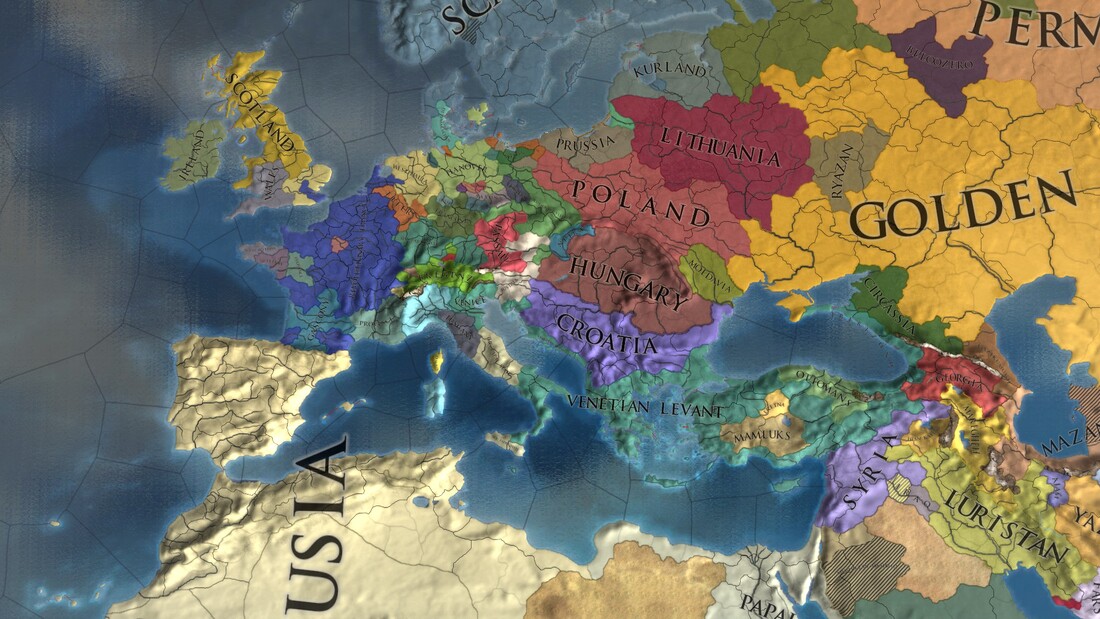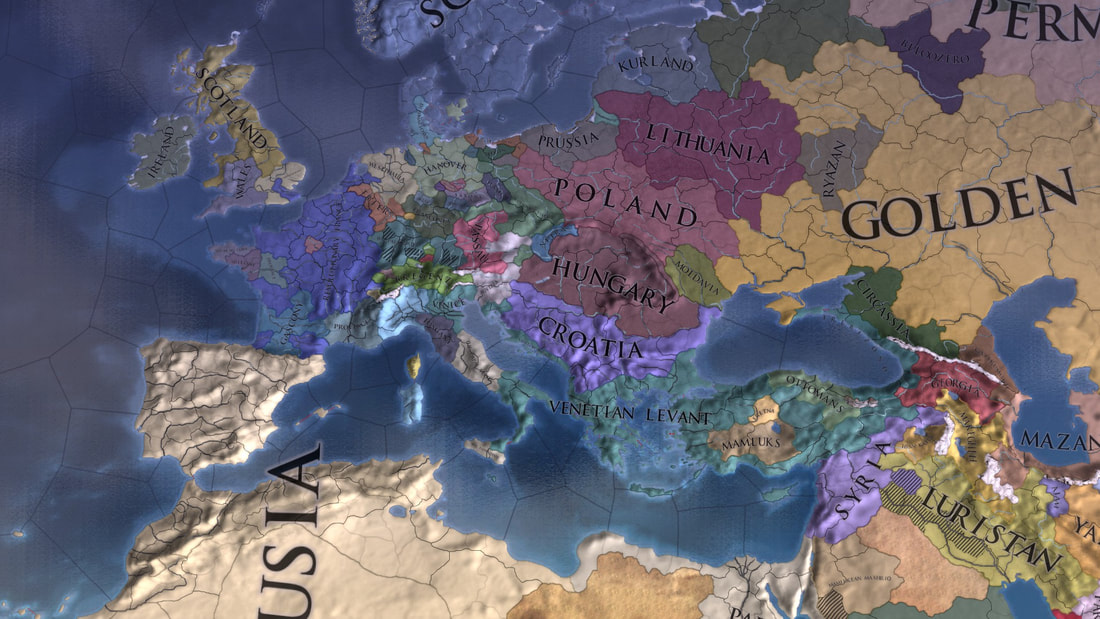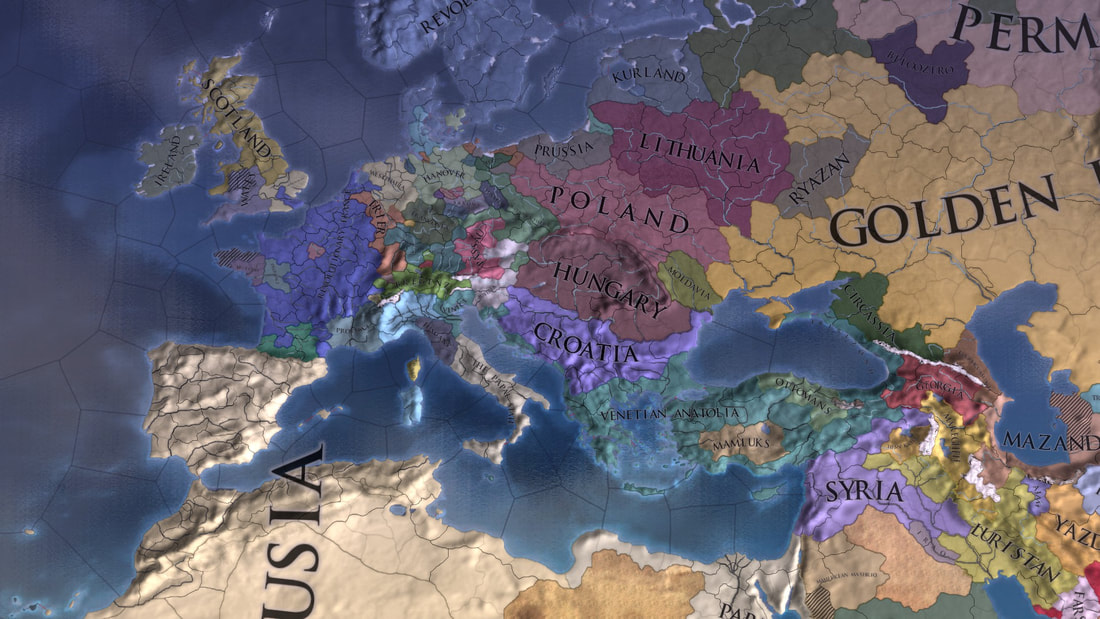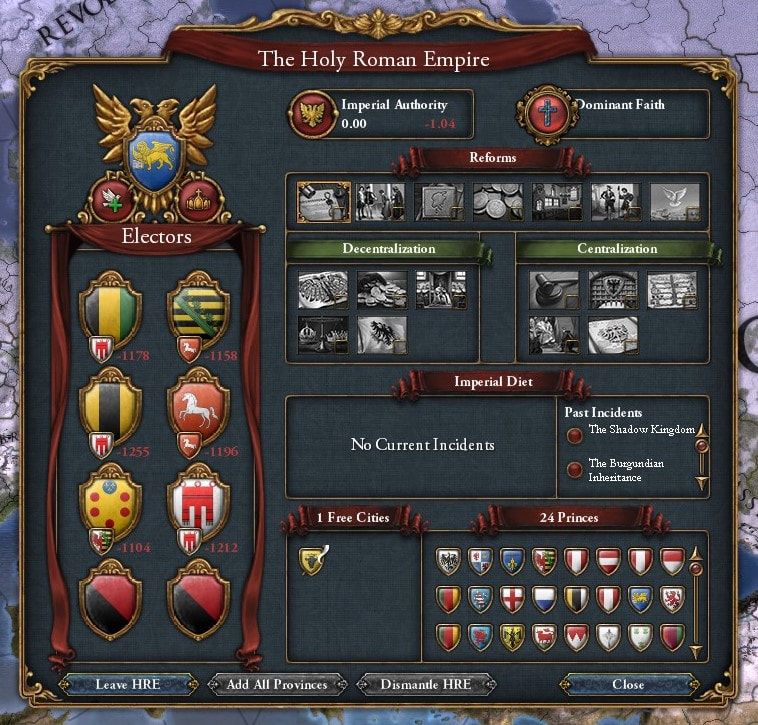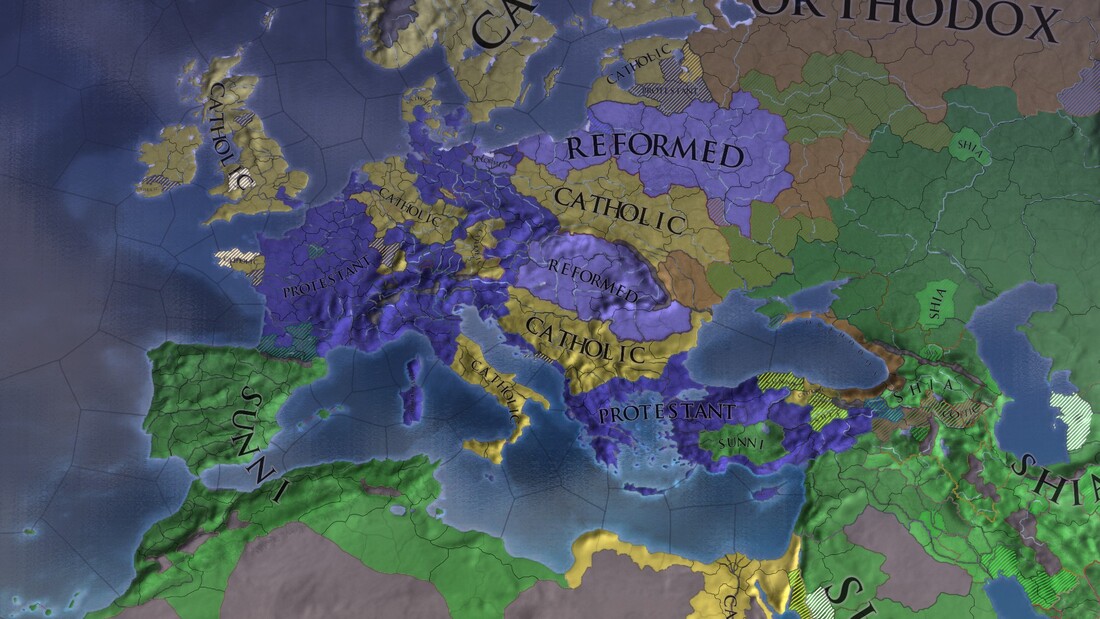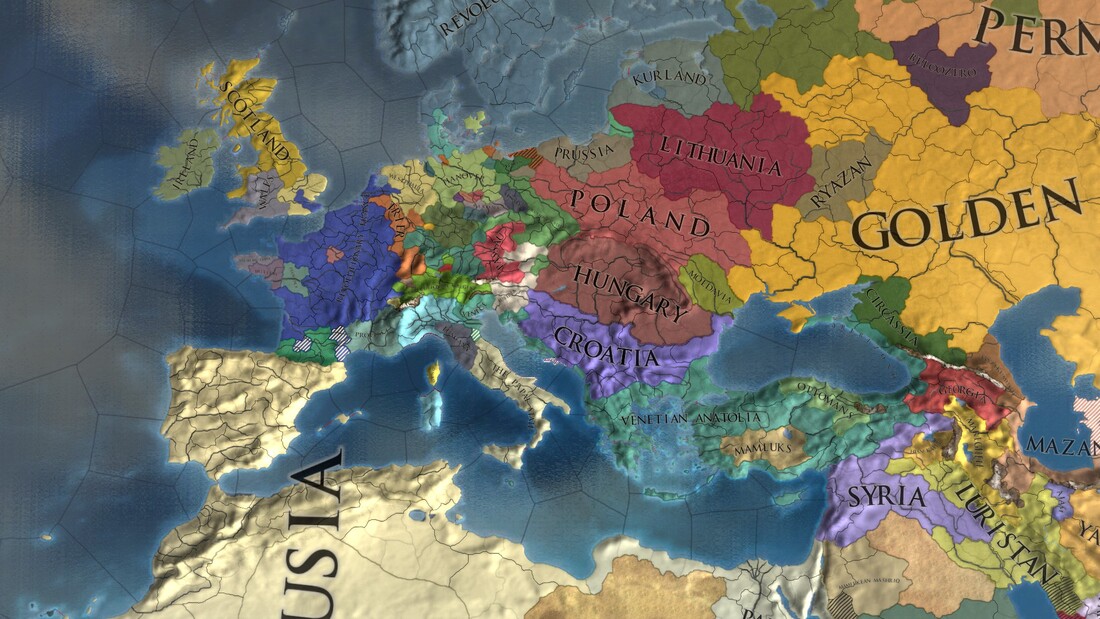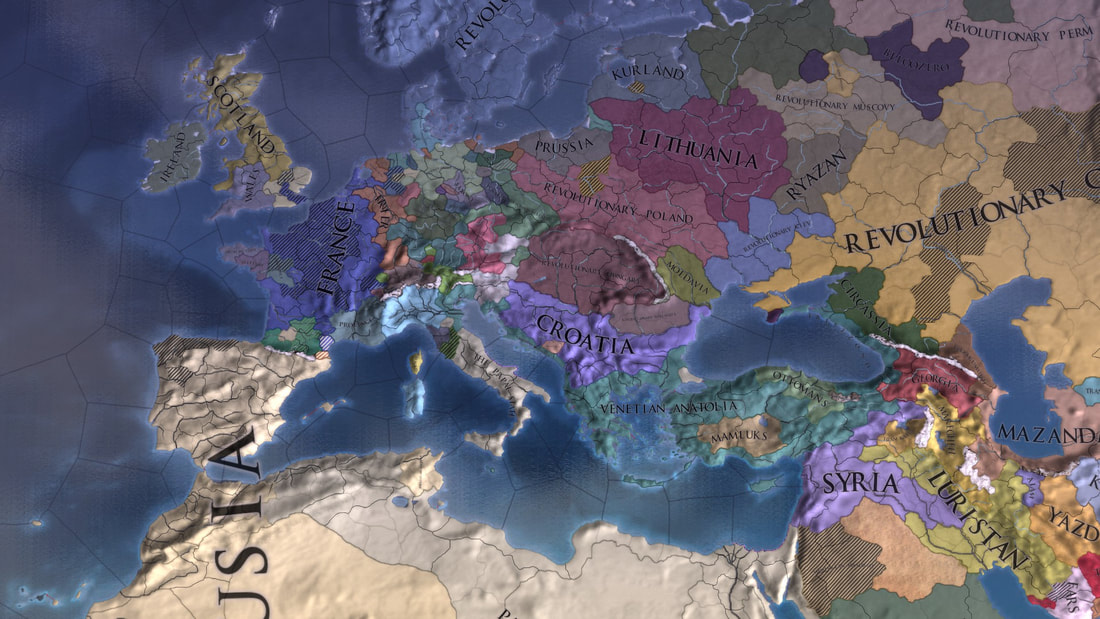Emperor II
|
Nation Selection - Feb 13, Saturday 19:00-20:00 EST
First Session - Feb 21, Sunday 19:00-22:00 EST |
FINAL RANKINGS - PRESTIGE
bread - Papacy - 23 "The Inquisitor"
Imperator/zweldon - R. Republic of Hanover - 17 "The Paladin"
Elijah - R. Republic of Silesia - 16
Iron/Brian - R. Republic of Franconia - 15
MoneyMaker/Braxton - R. Republic of Bregenz - 14
Eckrbe/Erik - R. Republic of Venice - 13 "The Autarch"
SpicyLunchbox/Weston - R. Republic of Passau - 12
lookatall/Blake - Sakerhetstinget of Scandinavia - 11
YoFlyMyGuy/Nate - Bishopric of Trier - 10
Cycoboy/Jorge - R. Republic of the Palatinate - 9
Pixel - Duchy of Prussia - 8
piano - Kingdom of Louisiana - 7
Requiem - G. Republic of Andalusia - 6
Alec - Republic of Tuscany - 5
Captain Dickers/Josh - G. Princedom of France - 4
Official Mr. Scruff/Brad - Empire of Hungary - 3
Blyatt/Wyatt - R. Rep. of Sardinia-Piedmont - 2
Dr Decoy - R. Rep. of the Golden Horde - 1
Imperator/zweldon - R. Republic of Hanover - 17 "The Paladin"
Elijah - R. Republic of Silesia - 16
Iron/Brian - R. Republic of Franconia - 15
MoneyMaker/Braxton - R. Republic of Bregenz - 14
Eckrbe/Erik - R. Republic of Venice - 13 "The Autarch"
SpicyLunchbox/Weston - R. Republic of Passau - 12
lookatall/Blake - Sakerhetstinget of Scandinavia - 11
YoFlyMyGuy/Nate - Bishopric of Trier - 10
Cycoboy/Jorge - R. Republic of the Palatinate - 9
Pixel - Duchy of Prussia - 8
piano - Kingdom of Louisiana - 7
Requiem - G. Republic of Andalusia - 6
Alec - Republic of Tuscany - 5
Captain Dickers/Josh - G. Princedom of France - 4
Official Mr. Scruff/Brad - Empire of Hungary - 3
Blyatt/Wyatt - R. Rep. of Sardinia-Piedmont - 2
Dr Decoy - R. Rep. of the Golden Horde - 1
Scoring Rules
Scoring - Victory Cards and Tier Objectives
In-game points will be ignored for this campaign. Instead, players may accumulate points as described below.
Ages and Scoring - This campaign will count score at the election (or inheritance) of each new Holy Roman Emperor instead of at the end of each Age, with an additional final scoring in 1821 at the campaign's end.
Most scoring is counted at the end of each Age, giving four opportunities for players to gain most of their score. Achieving these objectives is only counted at the end of the age, and will not count for any score if lost the day before the Age ends. Unless otherwise stated, these scores are multiplied by the number of the Age, meaning objectives become much more valuable over time. Score can also be gained in some ways that are immediate and any immediate score will generally be multiplied by the number of the Age it takes place during (Discovery - x1, Reformation - x2, Absolutism - x3, Revolution - x4).
Advice: Treachery works best when executed close to the end of an Age, giving others little chance to retaliate before score is counted, but it can also be difficult to quickly pry away an objective from another player. Generally it is more reliable to obtain objectives as early as possible and defend them, rather than steal them. On the other hand, securing objectives early and aggressively can set the field against you in the campaign's early diplomacy. Waiting until the late game to make decisive moves can pay off, as the Age multiplier can quickly catapult a player into the lead as long as previous leaders are deprived of their own sources of score.
Tiers - This campaign will have only 1 Tier, but players are in groups with unique scoring rules.
In order to allow players some choice in competitiveness and difficulty, the nations are placed in tiers that share most of their scoring objectives. A player cannot gain score from objectives from other tiers than their own. Players in Tier 1 will always place before players in Tier 2 in final rankings for the purpose of prestige and future nation selection, no matter the score. In other words, the highest score in Tier 2 will rank directly behind the lowest score in Tier 1 as long as the player finishes the game. This is to ensure that players who wish to challenge themselves with difficult starts and competitive opponents are not unduly punished for a tough campaign. The winner (highest score) from each tier, however, will win +5 to their Gametactica prestige and a Paradox DLC of their choice.
Advice: Allies from other tiers will likely be more reliable than allies from your own tier, since you should not need to directly compete over objectives or ranking. However, allies from other tiers are also less likely to be focused on similar goals.
Victory Cards - Victory Cards will not be used for this campaign.
Objectives - Scoring objectives differ depending on the nation's group (scoring will occur at the coronation of each new Holy Roman Emperor). Objectives count as owned by a nation if that nation owns it or if one of their AI subjects own it (the AI subject does not count as owning the objective unless otherwise specified). If an objective happens to be in a player's protected area, the objective province does not count as protected. Any player that is a subject (including a tributary) must give half the value of any objectives scored to his overlord (this includes any source of points unless specifically stated). If the overlord is an AI, then these points are simply lost.
Exalted Despots
- 1000 points for owning at least one of the objectives from a Conqueror Objective pair. Owning both objectives in a pair will still only be worth 1000 points total, but if any other Despot owns the other Conqueror Objective from that pair, both objectives are worth 0 pts.
- 1000 points for owning at least one Imperial Objective. Owning further Imperial Objectives will not yield any further points, but if two or more different Despots own any Imperial Objectives, all Imperial Objectives are worth 0 points for Despots.
Noble Counts
- For each Imperial Objective owned, Points equal to 10 times the number of member states in the Empire for each Imperial Objective owned with Free Cities counting as 2 states (90 at start).
- 1000 points for each Conqueror Objective owned.
- 500 points for every other Conqueror Objective that is owned by any member of the Holy Roman Empire (even AI or a member of another group) as long as the player is a member of the Empire (cooperative objective).
- 1000 points for any Imperial Reform passed for the first time (awarded to all Counts and scored immediately, not upon Imperial succession). This is increased to 2000 points for any Count that is the Emperor. If the Reform is a Centralization Reform this is increased to 4000 points for a Count who is the Emperor and no points are awarded to any other Counts. Points for Reforms will not be multiplied by Age.
- If a Count is ever Kingdom rank or higher and not a member of the Holy Roman Empire, they will be considered a Despot for the remainder of the campaign and be subject to their scoring rules. Previous score accumulated is not affected.
Righteous Bishops
- Each time that the Papacy gains or renews control of the Curia. The game will pause for the Ecumenical Council (see below). Except during the Ecumenical Council, the Papacy is not allowed to use Curia Treasury funds to appoint Cardinals or Investigate Heresy.
- 100 points for each province owned with a Cardinal. Cardinals in provinces owned by the Papacy do not count and are worth 0 score. Points for Cardinals will not be multiplied by Age.
- Points for each Papal Bull issued by a Bishop that holds the Curia will be equal to 1000 while the Tier level of the Catholic Defender of the Faith is V, and this value will be halved for each tier lower than V if the tier level drops (e.g. 250 points at tier level III). This is scored immediately, and not upon Imperial Succession.
- 500 points for each Conqueror or Imperial Objective that is held by a Catholic Theocracy or the Catholic Defender of the Faith (cooperative objective).
- 100 points for each Conqueror Objective or Imperial Objective province that is Catholic (cooperative objective).
- If a Bishop is ever Kingdom rank or higher and not a Theocracy, they will be considered a Despot for the remainder of the campaign and be subject to their scoring rules. Previous score accumulated is not affected.
Ecumenical Council of Bishops - When the Papacy wins control of the Curia, the game must pause to execute the following steps in order.
1. All Bishops, including the Papacy vote on if 500 ducats of the treasury should be spent to Investigate Heresy. If there is a tie vote, the Papacy decides the outcome. If the result is yes, the Papacy immediately Investigates.
2. The Papacy is allowed to choose or change his rivals as allowed by the game.
3. All Nations in good standing with the Papacy (Papal opinion above 0), may then request one Cardinal from the Papacy. At this time Nations may also spend available power to develop their provinces.
4. Using funds available from the Curia coffers, the Papacy must provide these Cardinals, starting with the owner of the highest development province without a Cardinal until either each requesting Nation has been awarded a Cardinal, 10 Cardinals have been awarded, or there are insufficient funds in the Curia coffers to supply the next Cardinal. Provinces held by subjects of a Nations count as being owned by that Nation during this process and if the Nation’s highest developed province is owned by a subject, than the subject is awarded the Cardinal. If there is a tie in province development at this point the two Nations must roll a d100 with the highest being awarded their Cardinal first. Because awarding a Cardinal uses a diplomat, these Cardinals will have to be owed, and must be instated before any Papal Bull’s may be passed.
In-game points will be ignored for this campaign. Instead, players may accumulate points as described below.
Ages and Scoring - This campaign will count score at the election (or inheritance) of each new Holy Roman Emperor instead of at the end of each Age, with an additional final scoring in 1821 at the campaign's end.
Most scoring is counted at the end of each Age, giving four opportunities for players to gain most of their score. Achieving these objectives is only counted at the end of the age, and will not count for any score if lost the day before the Age ends. Unless otherwise stated, these scores are multiplied by the number of the Age, meaning objectives become much more valuable over time. Score can also be gained in some ways that are immediate and any immediate score will generally be multiplied by the number of the Age it takes place during (Discovery - x1, Reformation - x2, Absolutism - x3, Revolution - x4).
Advice: Treachery works best when executed close to the end of an Age, giving others little chance to retaliate before score is counted, but it can also be difficult to quickly pry away an objective from another player. Generally it is more reliable to obtain objectives as early as possible and defend them, rather than steal them. On the other hand, securing objectives early and aggressively can set the field against you in the campaign's early diplomacy. Waiting until the late game to make decisive moves can pay off, as the Age multiplier can quickly catapult a player into the lead as long as previous leaders are deprived of their own sources of score.
Tiers - This campaign will have only 1 Tier, but players are in groups with unique scoring rules.
In order to allow players some choice in competitiveness and difficulty, the nations are placed in tiers that share most of their scoring objectives. A player cannot gain score from objectives from other tiers than their own. Players in Tier 1 will always place before players in Tier 2 in final rankings for the purpose of prestige and future nation selection, no matter the score. In other words, the highest score in Tier 2 will rank directly behind the lowest score in Tier 1 as long as the player finishes the game. This is to ensure that players who wish to challenge themselves with difficult starts and competitive opponents are not unduly punished for a tough campaign. The winner (highest score) from each tier, however, will win +5 to their Gametactica prestige and a Paradox DLC of their choice.
Advice: Allies from other tiers will likely be more reliable than allies from your own tier, since you should not need to directly compete over objectives or ranking. However, allies from other tiers are also less likely to be focused on similar goals.
Victory Cards - Victory Cards will not be used for this campaign.
Objectives - Scoring objectives differ depending on the nation's group (scoring will occur at the coronation of each new Holy Roman Emperor). Objectives count as owned by a nation if that nation owns it or if one of their AI subjects own it (the AI subject does not count as owning the objective unless otherwise specified). If an objective happens to be in a player's protected area, the objective province does not count as protected. Any player that is a subject (including a tributary) must give half the value of any objectives scored to his overlord (this includes any source of points unless specifically stated). If the overlord is an AI, then these points are simply lost.
Exalted Despots
- 1000 points for owning at least one of the objectives from a Conqueror Objective pair. Owning both objectives in a pair will still only be worth 1000 points total, but if any other Despot owns the other Conqueror Objective from that pair, both objectives are worth 0 pts.
- 1000 points for owning at least one Imperial Objective. Owning further Imperial Objectives will not yield any further points, but if two or more different Despots own any Imperial Objectives, all Imperial Objectives are worth 0 points for Despots.
Noble Counts
- For each Imperial Objective owned, Points equal to 10 times the number of member states in the Empire for each Imperial Objective owned with Free Cities counting as 2 states (90 at start).
- 1000 points for each Conqueror Objective owned.
- 500 points for every other Conqueror Objective that is owned by any member of the Holy Roman Empire (even AI or a member of another group) as long as the player is a member of the Empire (cooperative objective).
- 1000 points for any Imperial Reform passed for the first time (awarded to all Counts and scored immediately, not upon Imperial succession). This is increased to 2000 points for any Count that is the Emperor. If the Reform is a Centralization Reform this is increased to 4000 points for a Count who is the Emperor and no points are awarded to any other Counts. Points for Reforms will not be multiplied by Age.
- If a Count is ever Kingdom rank or higher and not a member of the Holy Roman Empire, they will be considered a Despot for the remainder of the campaign and be subject to their scoring rules. Previous score accumulated is not affected.
Righteous Bishops
- Each time that the Papacy gains or renews control of the Curia. The game will pause for the Ecumenical Council (see below). Except during the Ecumenical Council, the Papacy is not allowed to use Curia Treasury funds to appoint Cardinals or Investigate Heresy.
- 100 points for each province owned with a Cardinal. Cardinals in provinces owned by the Papacy do not count and are worth 0 score. Points for Cardinals will not be multiplied by Age.
- Points for each Papal Bull issued by a Bishop that holds the Curia will be equal to 1000 while the Tier level of the Catholic Defender of the Faith is V, and this value will be halved for each tier lower than V if the tier level drops (e.g. 250 points at tier level III). This is scored immediately, and not upon Imperial Succession.
- 500 points for each Conqueror or Imperial Objective that is held by a Catholic Theocracy or the Catholic Defender of the Faith (cooperative objective).
- 100 points for each Conqueror Objective or Imperial Objective province that is Catholic (cooperative objective).
- If a Bishop is ever Kingdom rank or higher and not a Theocracy, they will be considered a Despot for the remainder of the campaign and be subject to their scoring rules. Previous score accumulated is not affected.
Ecumenical Council of Bishops - When the Papacy wins control of the Curia, the game must pause to execute the following steps in order.
1. All Bishops, including the Papacy vote on if 500 ducats of the treasury should be spent to Investigate Heresy. If there is a tie vote, the Papacy decides the outcome. If the result is yes, the Papacy immediately Investigates.
2. The Papacy is allowed to choose or change his rivals as allowed by the game.
3. All Nations in good standing with the Papacy (Papal opinion above 0), may then request one Cardinal from the Papacy. At this time Nations may also spend available power to develop their provinces.
4. Using funds available from the Curia coffers, the Papacy must provide these Cardinals, starting with the owner of the highest development province without a Cardinal until either each requesting Nation has been awarded a Cardinal, 10 Cardinals have been awarded, or there are insufficient funds in the Curia coffers to supply the next Cardinal. Provinces held by subjects of a Nations count as being owned by that Nation during this process and if the Nation’s highest developed province is owned by a subject, than the subject is awarded the Cardinal. If there is a tie in province development at this point the two Nations must roll a d100 with the highest being awarded their Cardinal first. Because awarding a Cardinal uses a diplomat, these Cardinals will have to be owed, and must be instated before any Papal Bull’s may be passed.
Rewards
- $20 worth of Paradox DLC
- Prestige - Earn 1 Prestige for your name on the Campaign Player List for participating in the campaign plus 1 Prestige for each player that you place higher than. The highest scoring player will earn an additional 5 Prestige.
-Titles - In addition, the highest scoring player within each starting group will earn a title for their name on the Campaign Player List.
!Clarification for this campaign: A player's starting group cannot change!
Top scoring Noble Count - "The Paladin"
Top scoring Righteous Bishop - "The Inquisitor"
Top scoring Exalted Despot - "The Autarch"
- Nation selection in a future campaign will go in order of prestige earned in this campaign, except players who received prizes will pick last (in order of final score).
Other Campaign Rules
1. Diplomacy Campaign Rules - Rules to frustrate our most successful players
- The Gametactica campaign mod will make maintaining alliances difficult for Great Powers, forcing them to use other diplomatic options such as Guarantees and Enforce Peace in order to shepherd their sphere of influence.
2. The 30% Treaty Rule - To encourage riskier and shorter wars
In order to encourage more frequent, shorter wars that do not devolve into world-spanning conflicts, we will be using the 30% Rule in this campaign. At any point in a war that the primary aggressor/defender has 30% or more war-score, they may send a peace treaty demanding a white peace or the annexation of one province that they occupy, that is owned by the primary defender/aggressor, and that they share a border with by land or sea, and this peace treaty cannot be refused. To be unrefusable, the treaty must contain no other conditions except a white peace or the annexation of the single province and the province must not be a nation's capital. The sending player may pause the game for this treaty, so that the war-score will not change and the rule can be enforced. For this rule, provinces owned or occupied by non-tributary subjects count as being owned or occupied by their overlord.
3. Home Area Protection - Protection rules to maintain a minimal power base of every player.
Any player who loses their capital Area holdings to another nation will be able to pay a nominal fee to immediately seize the territory back. In this way, each player's starting Area is safe from annexation and players are not allowed to eliminate other players.
4. Endless Player Restart - Protection rules to maintain a minimal power base of every player.
If a player is eliminated by the AI, his starting capital, and all provinces in his capital's area that still have cores of his nation, will be released at the start of the next session as a vassal of the nation that now owns his starting capital province.
5. One-Time Absence Protection - Protection rules to maintain a minimal power base of every player.
During a missed session, a player may invoke protection for their nation one time. Other players may not attack a protected nation, and may not demand any peace terms from their nation if they find themselves at war by other means. Otherwise absent players' nations are not protected in missed sessions and players cannot take advantage of protection after the year 1750 regardless. If a war continues into a player's protected session, his enemies may not demand the ceding/release of land they did not occupy at the start of the protected session, or release nations that do not entirely exist within land they occupied at the start of the protected session, but other treaty terms that have no direct effect on province ownership are allowed in this situation. This protection is ignored in any wars initiated by the protected nation that target another player, so players are responsible for ensuring their nation is passive during their absence in their AI settings. Please inform one of the game hosts anytime before the start of a session if you will be absent and would like to use your protection. Protection may be used if arriving late but not for departing early.
6. Switching to a new Nation
A player may use the vassal release mechanic or colonial nation release mechanic to switch to playing another nation. Protected Areas in the campaign will not be changed. Players may switch nations via any in-game decision available, but their Protected Area will never change.
7. Nation Selection
Selection Order - Nation selection in this campaign will draw from the final rankings of each player's most recent EU4 Gametactica campaign (using the previous rewards description). Excluding recent title-winners (who will be selecting last), all players returning from previous campaigns will be able to to select nations in order of their final ranking descending from top score to lowest score, followed by any new players in a randomly determined order, followed by recent title-winners in order of final ranking. A player who has played in earlier campaigns but did not participate in the most recent campaign will be allowed to use the final ranking of their latest campaign to determine their selection placement, and will be placed directly behind the player of equivalent ranking from the most recent campaign. Any players who missed more than 50% of sessions in their last campaign will not pick according to score and will be placed at the end of the selection order in a random ranking determined by d100. A roll of 80 or higher will also place them before the 'title-winner' group, just to make things a bit less predictable.
Tiers - Tiers are not being used in this campaign. Please remember to choose a tier that reflects the challenge and intensity that you wish to experience. While you will interact and compete for the same resources with all other players, your score will only be compared to players from within your own tier. Tier 1 is rewarded with first choice from the (undisclosed) prize pool (winner only) and earliest choices in nation selection in the next campaign (according to the latest "rewards" update seen below), and is intended for players seeking difficult starts, intense diplomacy and intrigue, and experienced competition. Tier 4 is intended for players seeking more secure starts, more room to learn, more leniency for absences, and a fair amount of cooperation alongside their competition, but will have later placement for the next nation selection and its winner gets last selection from the prize pool. With four tiers, it is hoped that each player will be given some chance to customize their game experience.
Imbalance - Obviously, even within tiers, the nation choices are imbalanced in strength, making earlier selection positions very valuable for grabbing the "best" nations in any one tier. The choices available have been selected to allow each player good opportunities to use diplomacy and intrigue to compensate for any lacking in raw military or economic might. Any viewing of the previous campaign final rankings should be sufficient evidence to support the fact that starting nation strength does not predict final ranking.
Hidden Nations - Once any tier has had all available nations claimed, any Hidden nations in that tier will become available for selection, with possibly drastic changes to that tier's balance of power. This means that these secret nations will be impossible to pick by those with the earliest picks and that some unfortunate players may be be forced to select a lone available nation before more hidden nations become available. These new nations could be of major or insignificant power, may not appear at all if a tier is left unfinished, and will likely be great sources of hope and disappointment for those stuck with the last picks. The campaign designer(s) is not permitted to select one of these secret nations if any other choice is available.
8. Discord War Camps - Public channels for private coordination
Please do not enter occupied War Camp channels unless invited by an occupant. These channels are available for both plotting in peacetime and coordination during wartime. Refusing to respect War Camp privacy will lead to being kicked from the Discord.
9. Shared Bloodlines - Mentoring - Only possible in campaigns with Tiers
In order to mitigate the steep learning curve of EU4 for new players and to prevent the worst forms of manipulation, it is helpful to have at least one player that any newer player can know is a trustworthy source of advice. Towards that end, two players may agree to play in a Shared Bloodlines format in this campaign, conferring the below unique mechanics:
- Both players will choose their nation together, at the earliest selection position of the two players.
- The players must choose two nations in different Tiers. The player in the higher tier will be considered the "Mentor".
- The Mentor's nation selection must own 10 provinces or less and the Mentor may never exceed ownership of more than 10 provinces throughout the course of the campaign. Ownership for this purpose will include all Personal Unions, due to their inheritance mechanics, but excludes Vassals, Colonial Nations, and provinces assigned to a Trade Company. Willful violation of this rule will cause the independent release of all foreign cores within the Mentor's nation and all subjects at the end of the session. Violation of this rule outside of the Mentor's control must be immediately rectified by province release in-game.
- All score from Victory Cards and the specific provinces designated as Age Objectives will be combined from both players and split evenly between them. Other objectives will not be split due to possible improportionalities between Tier scoring systems.
- Any victory cards from either nation that fall on land that would penalize their partner will be rerolled.
- The Gametactica campaign mod will make maintaining alliances difficult for Great Powers, forcing them to use other diplomatic options such as Guarantees and Enforce Peace in order to shepherd their sphere of influence.
2. The 30% Treaty Rule - To encourage riskier and shorter wars
In order to encourage more frequent, shorter wars that do not devolve into world-spanning conflicts, we will be using the 30% Rule in this campaign. At any point in a war that the primary aggressor/defender has 30% or more war-score, they may send a peace treaty demanding a white peace or the annexation of one province that they occupy, that is owned by the primary defender/aggressor, and that they share a border with by land or sea, and this peace treaty cannot be refused. To be unrefusable, the treaty must contain no other conditions except a white peace or the annexation of the single province and the province must not be a nation's capital. The sending player may pause the game for this treaty, so that the war-score will not change and the rule can be enforced. For this rule, provinces owned or occupied by non-tributary subjects count as being owned or occupied by their overlord.
3. Home Area Protection - Protection rules to maintain a minimal power base of every player.
Any player who loses their capital Area holdings to another nation will be able to pay a nominal fee to immediately seize the territory back. In this way, each player's starting Area is safe from annexation and players are not allowed to eliminate other players.
4. Endless Player Restart - Protection rules to maintain a minimal power base of every player.
If a player is eliminated by the AI, his starting capital, and all provinces in his capital's area that still have cores of his nation, will be released at the start of the next session as a vassal of the nation that now owns his starting capital province.
5. One-Time Absence Protection - Protection rules to maintain a minimal power base of every player.
During a missed session, a player may invoke protection for their nation one time. Other players may not attack a protected nation, and may not demand any peace terms from their nation if they find themselves at war by other means. Otherwise absent players' nations are not protected in missed sessions and players cannot take advantage of protection after the year 1750 regardless. If a war continues into a player's protected session, his enemies may not demand the ceding/release of land they did not occupy at the start of the protected session, or release nations that do not entirely exist within land they occupied at the start of the protected session, but other treaty terms that have no direct effect on province ownership are allowed in this situation. This protection is ignored in any wars initiated by the protected nation that target another player, so players are responsible for ensuring their nation is passive during their absence in their AI settings. Please inform one of the game hosts anytime before the start of a session if you will be absent and would like to use your protection. Protection may be used if arriving late but not for departing early.
6. Switching to a new Nation
A player may use the vassal release mechanic or colonial nation release mechanic to switch to playing another nation. Protected Areas in the campaign will not be changed. Players may switch nations via any in-game decision available, but their Protected Area will never change.
7. Nation Selection
Selection Order - Nation selection in this campaign will draw from the final rankings of each player's most recent EU4 Gametactica campaign (using the previous rewards description). Excluding recent title-winners (who will be selecting last), all players returning from previous campaigns will be able to to select nations in order of their final ranking descending from top score to lowest score, followed by any new players in a randomly determined order, followed by recent title-winners in order of final ranking. A player who has played in earlier campaigns but did not participate in the most recent campaign will be allowed to use the final ranking of their latest campaign to determine their selection placement, and will be placed directly behind the player of equivalent ranking from the most recent campaign. Any players who missed more than 50% of sessions in their last campaign will not pick according to score and will be placed at the end of the selection order in a random ranking determined by d100. A roll of 80 or higher will also place them before the 'title-winner' group, just to make things a bit less predictable.
Tiers - Tiers are not being used in this campaign. Please remember to choose a tier that reflects the challenge and intensity that you wish to experience. While you will interact and compete for the same resources with all other players, your score will only be compared to players from within your own tier. Tier 1 is rewarded with first choice from the (undisclosed) prize pool (winner only) and earliest choices in nation selection in the next campaign (according to the latest "rewards" update seen below), and is intended for players seeking difficult starts, intense diplomacy and intrigue, and experienced competition. Tier 4 is intended for players seeking more secure starts, more room to learn, more leniency for absences, and a fair amount of cooperation alongside their competition, but will have later placement for the next nation selection and its winner gets last selection from the prize pool. With four tiers, it is hoped that each player will be given some chance to customize their game experience.
Imbalance - Obviously, even within tiers, the nation choices are imbalanced in strength, making earlier selection positions very valuable for grabbing the "best" nations in any one tier. The choices available have been selected to allow each player good opportunities to use diplomacy and intrigue to compensate for any lacking in raw military or economic might. Any viewing of the previous campaign final rankings should be sufficient evidence to support the fact that starting nation strength does not predict final ranking.
Hidden Nations - Once any tier has had all available nations claimed, any Hidden nations in that tier will become available for selection, with possibly drastic changes to that tier's balance of power. This means that these secret nations will be impossible to pick by those with the earliest picks and that some unfortunate players may be be forced to select a lone available nation before more hidden nations become available. These new nations could be of major or insignificant power, may not appear at all if a tier is left unfinished, and will likely be great sources of hope and disappointment for those stuck with the last picks. The campaign designer(s) is not permitted to select one of these secret nations if any other choice is available.
8. Discord War Camps - Public channels for private coordination
Please do not enter occupied War Camp channels unless invited by an occupant. These channels are available for both plotting in peacetime and coordination during wartime. Refusing to respect War Camp privacy will lead to being kicked from the Discord.
9. Shared Bloodlines - Mentoring - Only possible in campaigns with Tiers
In order to mitigate the steep learning curve of EU4 for new players and to prevent the worst forms of manipulation, it is helpful to have at least one player that any newer player can know is a trustworthy source of advice. Towards that end, two players may agree to play in a Shared Bloodlines format in this campaign, conferring the below unique mechanics:
- Both players will choose their nation together, at the earliest selection position of the two players.
- The players must choose two nations in different Tiers. The player in the higher tier will be considered the "Mentor".
- The Mentor's nation selection must own 10 provinces or less and the Mentor may never exceed ownership of more than 10 provinces throughout the course of the campaign. Ownership for this purpose will include all Personal Unions, due to their inheritance mechanics, but excludes Vassals, Colonial Nations, and provinces assigned to a Trade Company. Willful violation of this rule will cause the independent release of all foreign cores within the Mentor's nation and all subjects at the end of the session. Violation of this rule outside of the Mentor's control must be immediately rectified by province release in-game.
- All score from Victory Cards and the specific provinces designated as Age Objectives will be combined from both players and split evenly between them. Other objectives will not be split due to possible improportionalities between Tier scoring systems.
- Any victory cards from either nation that fall on land that would penalize their partner will be rerolled.
MoDs
Gametactica Campaign Mod
https://steamcommunity.com/sharedfiles/filedetails/?id=2388202502
Increased Diplomat Reliance:
- Alliances require a mutual 75+ opinion to create and maintain. This means your diplomats will be more vital to alliances, and actions such as guaranteeing independence and enforcing peace will be more useful as unilateral actions.
Decreased ability to rapidly expand:
- Higher war-score costs for annexations. This means discounts from casus belli will be important to your goals.
- Higher Aggressive Expansion, Over-Expansion, and Increased rebellion strength. This means expanding quickly is far more risky and supporting rebels is far more effective.
Idea Group changes:
- Increased significance of non-military Idea Groups
https://steamcommunity.com/sharedfiles/filedetails/?id=2388202502
Increased Diplomat Reliance:
- Alliances require a mutual 75+ opinion to create and maintain. This means your diplomats will be more vital to alliances, and actions such as guaranteeing independence and enforcing peace will be more useful as unilateral actions.
Decreased ability to rapidly expand:
- Higher war-score costs for annexations. This means discounts from casus belli will be important to your goals.
- Higher Aggressive Expansion, Over-Expansion, and Increased rebellion strength. This means expanding quickly is far more risky and supporting rebels is far more effective.
Idea Group changes:
- Increased significance of non-military Idea Groups
The nations available are listed below, in order of most desirable starting conditions within each grouping.
The Hidden nations for each group will be revealed when all other nations in the group have been selected or if any player only has a single nation to choose from during his turn.
The Hidden nations for each group will be revealed when all other nations in the group have been selected or if any player only has a single nation to choose from during his turn.
Groups
(No tiers)
(No tiers)
|
Noble Counts
Palatinate (Elector) - Jorge Luneburg - zweldon Saluzzo - Wyatt Bregenz - Braxton Florence - Alec Opole - Elijah |
Righteous Bishops
Munster (Elector replacing Cologne) - piano Trier (Elector) - Nate Wurzburg (Elector replacing Mainz) - Brian Teutonic Order - Pixel Papal State - bread Passau - Weston |
Exalted Despots
Hungary - Brad Sweden - Blake Burgundy - Josh Venice - Erik Tunis - Requiem Great Horde - Dr Decoy |
|
Conqueror Objectives
(8 objectives, 4 Pairs) Paris - Sjælland Warszawa - Riga Ragusa - Constantinople Barcelona - Napoli |
Imperial Objectives
Wien Berlin Ulm Frankfurt Lubeck Milano |
the Noble Counts
The Electoral Palatinate - Elector Palatine Ludwig IV von Wittelsbach
- Starting Development: 40
- Provinces: 4
- Fort Level: 5
The County of Luneburg - Count Otto I von Welf
- Starting Development: 14
- Provinces: 2
- Fort Level: 1
The County of Saluzzo - Count Ludovico I del Vasto
- Starting Development: 11
- Provinces: 1
- Fort Level: 1
The County of Bregenz - Countess Elisabeth II von Montfort-Bregenz
- Starting Development: 5
- Provinces: 1
- Fort Level: 1
The Republic of Florence - Gonfaloniere Cosimo de'Medici
- Starting Development: 57
- Provinces: 3
- Fort Level: 3
The County of Opole - Count Mikolaj Piast
- Starting Development: 29
- Provinces: 3
- Fort Level: 1
- Starting Development: 40
- Provinces: 4
- Fort Level: 5
The County of Luneburg - Count Otto I von Welf
- Starting Development: 14
- Provinces: 2
- Fort Level: 1
The County of Saluzzo - Count Ludovico I del Vasto
- Starting Development: 11
- Provinces: 1
- Fort Level: 1
The County of Bregenz - Countess Elisabeth II von Montfort-Bregenz
- Starting Development: 5
- Provinces: 1
- Fort Level: 1
The Republic of Florence - Gonfaloniere Cosimo de'Medici
- Starting Development: 57
- Provinces: 3
- Fort Level: 3
The County of Opole - Count Mikolaj Piast
- Starting Development: 29
- Provinces: 3
- Fort Level: 1
the Righteous Bishops
The Bishopric of Munster - Bishop-Elector Heinrich II
- Starting Development: 28
- Provinces: 3
- Fort Level: 3
The Archbishopric of Trier - Archbishop-Elector Jakob von Sirk
- Starting Development: 22
- Provinces: 2
- Fort Level: 3
The Bishopric of Wurzburg - Bishop-Elector Gottfried IV
- Starting Development: 16
- Provinces: 2
- Fort Level: 3
- Begins with Vassals: Bamberg (6 development)
The Order of the Teutonic Knights - Hochmeister Konrad von Erlichshausen
- Starting Development: 99
- Provinces: 11
- Fort Level: 7
The Papacy - Pope Eugenius IV
- Starting Development: 63
- Provinces: 5
- Fort Level: 5
- Begins with Vassals: Urbino, Perugia (20 development)
The Bishopric of Passau - Bishop Leonard von Laiming
- Starting Development: 11
- Provinces: 1
- Fort Level: 1
- Begins as a Vassal under the County of Munich
- Starting Development: 28
- Provinces: 3
- Fort Level: 3
The Archbishopric of Trier - Archbishop-Elector Jakob von Sirk
- Starting Development: 22
- Provinces: 2
- Fort Level: 3
The Bishopric of Wurzburg - Bishop-Elector Gottfried IV
- Starting Development: 16
- Provinces: 2
- Fort Level: 3
- Begins with Vassals: Bamberg (6 development)
The Order of the Teutonic Knights - Hochmeister Konrad von Erlichshausen
- Starting Development: 99
- Provinces: 11
- Fort Level: 7
The Papacy - Pope Eugenius IV
- Starting Development: 63
- Provinces: 5
- Fort Level: 5
- Begins with Vassals: Urbino, Perugia (20 development)
The Bishopric of Passau - Bishop Leonard von Laiming
- Starting Development: 11
- Provinces: 1
- Fort Level: 1
- Begins as a Vassal under the County of Munich
the exalted despots
The Kingdom of Hungary - Interregnum
- Starting Development: 176
- Provinces: 23
- Fort Level: 11
- Begins with Personal Unions: Croatia (41 Development)
The Duchy of Burgundy - Duke Phillipe III de Bourgogne
- Starting Development: 147
- Provinces: 11
- Fort Level: 11
- Begins with Vassals: Nevers (27 Development)
- Begins with Personal Unions: Brabant, Flanders, Holland (140 Development)
The Kingdom of Sweden - Arch-King Christopher III von Wittelsbach
- Starting Development: 119
- Provinces: 26
- Fort Level: 9
- Begins under a Personal Union with the Kingdom of Denmark
The Serene Republic of Venice - Serene Doge Francesco Foscari
- Starting Development: 175
- Provinces: 16
- Fort Level: 9
- Begins with Vassals: Naxos (6 development)
The Sultanate of Tunis - Sultan Uthman Hafsid
- Starting Development: 111
- Provinces: 16
- Fort Level: 5
The Khanate of the Great Horde - Khan Kuchuk Genghisid
- Starting Development: 131
- Provinces: 15
- Fort Level: 3
- Starting Development: 176
- Provinces: 23
- Fort Level: 11
- Begins with Personal Unions: Croatia (41 Development)
The Duchy of Burgundy - Duke Phillipe III de Bourgogne
- Starting Development: 147
- Provinces: 11
- Fort Level: 11
- Begins with Vassals: Nevers (27 Development)
- Begins with Personal Unions: Brabant, Flanders, Holland (140 Development)
The Kingdom of Sweden - Arch-King Christopher III von Wittelsbach
- Starting Development: 119
- Provinces: 26
- Fort Level: 9
- Begins under a Personal Union with the Kingdom of Denmark
The Serene Republic of Venice - Serene Doge Francesco Foscari
- Starting Development: 175
- Provinces: 16
- Fort Level: 9
- Begins with Vassals: Naxos (6 development)
The Sultanate of Tunis - Sultan Uthman Hafsid
- Starting Development: 111
- Provinces: 16
- Fort Level: 5
The Khanate of the Great Horde - Khan Kuchuk Genghisid
- Starting Development: 131
- Provinces: 15
- Fort Level: 3
Session 1 -- 1444-1479
2 Imperial elections
|
Papacy Archbishopric of Trier Archbishopric of Wurzburg Bishopric of Passau Archbishopric of Munster Order of the Teutonic Knights Kingdom of Venice Kingdom of Hungary Electoral Palatinate Duchy of Luneburg Duchy of Saluzzo Duchy of Bregenz Republic of Florence Duchy of Opole Duchy of Burgundy Kingdom of Sweden Sultanate of Tunis Khanate of the Great Horde |
Total Score
5600 4800 4700 4700 4600 4600 2000 1000 |
Conqueror Objectives
2900 2900 2900 2900 2900 2900 2000 1000 |
Imperial Objectives
1700 1700 1700 1700 1700 1700 |
Reforms or Curia Control
1000 200 100 100 |
|
1459 - Emperor Friedrich II von Wettin (Saxony)
|
1474 - Emperor Jiri z Podebrad (Bohemia)
|
Objectives that are awarding points will be colored to match the benefiting player. e.g. Venice
Objectives that are awarding points to a group will be noted adjacent to the owning nation. e.g. (Bishops)
Note that despots do not gain points if another despot owns a paired objective. e.g. Paris and Copenhagen
Objectives that are Catholic and awarding points to the Bishops will be colored yellow.
Points from Imperial Reforms, Cardinals, and Papal Bulls are not indicated as they are not related to objective provinces.
Objectives that are awarding points to a group will be noted adjacent to the owning nation. e.g. (Bishops)
Note that despots do not gain points if another despot owns a paired objective. e.g. Paris and Copenhagen
Objectives that are Catholic and awarding points to the Bishops will be colored yellow.
Points from Imperial Reforms, Cardinals, and Papal Bulls are not indicated as they are not related to objective provinces.
SESSION 2 -- 1479-1516
3 Imperial elections
|
Papacy Bishopric of Passau Archbishopric of Trier Archbishopric of Munster Archbishopric of Wurzburg Order of the Teutonic Knights Kingdom of Venice Kingdom of Hungary Electoral Palatinate Imperial Duchy of Luneburg Duchy of Saluzzo Duchy of Bregenz Republic of Florence Duchy of Silesia Duchy of Burgundy Kingdom of Sweden Sultanate of Tunis Khanate of the Great Horde |
Total Score
15000 13600 13500 13400 13200 13000 5000 4000 1000 1000 1000 1000 1000 1000 |
Conqueror Objectives
5100 5100 5100 5100 5100 5100 3000 3000 |
Imperial Objectives
3300 3300 3300 3300 3300 3300 |
Reforms or Curia Control
1000 500 300 400 100 1000 1000 1000 1000 1000 1000 |
|
1479 - Emperor Leopold VIII von Habsburg (Austria)
|
1493 - Emperor Franz I von Wittelsbach (Austria)
|
|
1495 - Emperor August I von Welf (Luneburg)
|
Session 3 -- 1516-1555
2 Imperial elections
|
Archbishopric of Munster Papacy Order of the Teutonic Knights Bishopric of Passau Archbishopric of Trier Archbishopric of Wurzburg Kingdom of Venice Duchy of Hanover Duchy of Silesia Duchy of Bregenz Kingdom of Hungary Kingdom of Sweden Kingdom of Sardinia-Piedmont Electoral Palatinate Republic of Florence Duchy of Burgundy Sultanate of Andalusia Khanate of the Great Horde |
Total Score
23400 21200 21000 20500 20300 19900 9000 5200 5200 4100 4000 4000 3200 3000 3000 |
Conqueror Objectives
3400 3400 3400 3400 3400 3400 4000 2000 2000 2000 4000 2000 2000 |
Imperial Objectives
2800 2800 2800 2800 2800 2800 2200 2200 1100 2200 |
Reforms or Curia Control
3800 1800 700 600 500 |
|
1531 - Emperor Louis XII de Valois (France)
|
1542 - Emperor Louis XIII de Valois (France)
|
Session 4 -- 1555-1588
3 Imperial electionS
|
Archbishopric of Westphalia Papacy Order of the Teutonic Knights Bishopric of Passau Archbishopric of Wurzburg Archbishopric of Trier Kingdom of Venice Duchy of Hanover Duchy of Silesia Kingdom of Sweden Imperial Duchy of Bregenz Electoral Palatinate Republic of Tuscany Sultanate of Andalusia Kingdom of Sardinia-Piedmont Kingdom of Hungary Duchy of Burgundy Khanate of the Great Horde |
Total Score
33900 32200 31800 31000 29600 29500 15000 10640 10640 10000 9540 6000 6000 6000 5200 4000 |
Conqueror Objectives
5000 5000 5000 5000 5000 5000 6000 3000 3000 6000 3000 3000 3000 6000 |
Imperial Objectives
4000 4000 4000 4000 4000 4000 2440 2440 2440 2000 |
Reforms or Curia Control
1500 2000 1800 1500 700 200 |
|
1560 - Emperor Francois II de Valois (France)
|
1576 - Emperor Ulrich XIII von Montfort-Bregenz (Bregenz)
|
|
1578 - Emperor Hugo XIII von Montfort-Bregenz (Bregenz)
|
Session 5 -- 1588-1621
1 Imperial election
|
Bishopric of Westphalia Papacy Order of the Teutonic Knights Bishopric of Passau Bishopric of Franconia Bishopric of Trier Kingdom of Venice Kingdom of Hanover Kingdom of Silesia Imperial Kingdom of Sweden Duchy of Bregenz Electoral Palatinate G. Republic of Tuscany Empire of Andalusia Kingdom of Sardinia-Piedmont Kingdom of Hungary Duchy of Burgundy Khaganate of the Golden Horde |
Total Score
36500 35800 34900 34800 32600 30950 17000 14460 14460 13450 13360 9000 9000 8000 5200 4000 |
Conqueror Objectives
1200 1200 1200 1200 1200 600 2000 3000 3000 2600 3000 3000 3000 2000 |
Imperial Objectives
1400 1400 1400 1400 1400 700 820 820 700 820 |
Reforms or Curia Control
1000 500 1200 400 150 150 |
|
1603 - Emperor Karl IX Haard (Sweden)
|
Session 6 -- 1621-1652
2 Imperial election
|
Papacy Bishopric of Passau Bishopric of Franconia Bishopric of Westphalia Duchy of Prussia Bishopric of Trier Imperial Kingdom of Hanover Kingdom of Silesia Kingdom of Bregenz Kingdom of Scandinavia Empire of Venice Electoral Palatinate G. Republic of Tuscany Empire of Andalusia Kingdom of Hungary Kingdom of Sardinia-Piedmont Duchy of Burgundy Empire of the Golden Horde |
Total Score
50500 47200 45100 42350 40950 37500 29160 29160 28060 25850 23000 21000 21000 14000 10050 5200 |
Conqueror Objectives
7500 7500 7500 3750 3750 3750 12000 12000 12000 7500 6000 12000 12000 6000 3750 |
Imperial Objectives
4200 4200 4200 2100 2100 2100 2700 2700 2700 4200 2100 |
Reforms or Curia Control
3000 700 800 200 700 700 200 |
|
1626 - Emperor Mose III Zorzi (Venice)
|
1632 - Emperor Wilhelm Piast (Hanover)
|
Session 7 -- 1652-1685
1 Imperial election
|
Papacy Bishopric of Franconia Bishopric of Passau Bishopric of Westphalia Duchy of Prussia Bishopric of Trier Imperial Kingdom of Hanover Kingdom of Scandinavia Kingdom of Silesia Kingdom of Bregenz Empire of Venice Electoral Palatinate G. Republic of Tuscany Empire of Andalusia Kingdom of Hungary Kingdom of Sardinia-Piedmont Duchy of Burgundy Empire of the Golden Horde |
Total Score
55000 51700 50450 44600 43200 40200 34890 34050 33390 32290 27500 24000 22500 17000 12300 5200 3000 |
Conqueror Objectives
2400 2400 1200 1200 1200 1200 4500 3600 3000 3000 4500 3000 1500 3000 1200 3000 |
Imperial Objectives
2100 2100 1050 1050 1050 1050 1230 3150 1230 1230 1050 |
Reforms or Curia Control
2100 1000 450 1450 |
|
1668 - Emperor Karl Piast (Hanover)
|
Session 8 -- 1685-1718
2 Imperial election
|
Papacy Bishopric of Franconia Bishopric of Passau Bishopric of Trier Kingdom of Hanover Bishopric of Westphalia Duchy of Prussia Kingdom of Silesia Kingdom of Bregenz Kingdom of Scandinavia Empire of Venice Electoral Palatinate G. Republic of Tuscany Empire of Andalusia Kingdom of Hungary Duchy of Burgundy Kingdom of Sardinia-Piedmont Empire of the Golden Horde |
Total Score
63400 61300 55150 50000 49350 48800 47400 44850 43750 42950 38000 33000 27000 23000 16500 9000 5200 |
Conqueror Objectives
4200 4200 2100 4200 12000 2100 2100 9000 9000 4200 10500 9000 4500 6000 2100 6000 |
Imperial Objectives
4200 4200 2100 4200 2460 2100 2100 2460 2460 4200 2100 |
Reforms or Curia Control
1200 500 1400 500 |
|
1694 - Emperor Giovanni II Zorzi (Venice)
|
1695 - Emperor Mose Zorzi (Venice)
|
Session 8 -- 1718-1749
1 Imperial election
|
Papacy Bishopric of Franconia Kingdom of Hanover Bishopric of Passau Kingdom of Silesia Kingdom of Bregenz Bishopric of Trier Bishopric of Westphalia Duchy of Prussia Kingdom of Scandinavia Empire of Venice Electoral Palatinate G. Republic of Tuscany Empire of Andalusia Kingdom of Hungary Duchy of Burgundy Kingdom of Sardinia-Piedmont Empire of the Golden Horde |
Total Score
68200 66700 60790 56900 55730 53190 51750 50200 48800 46100 46000 42440 31000 27000 17900 14750 9200 |
Conqueror Objectives
2800 2800 10000 1400 8000 8000 1400 1400 1400 2800 8000 8000 4000 4000 1400 5400 |
Imperial Objectives
1440 2880 1440 1440 4000 |
Reforms or Curia Control
2000 2600 350 350 350 350 |
|
1741 - Emperor Giovanni III Zorzi (Venice)
|
Session 9 -- 1749-1781
3 Imperial elections
|
Kingdom of Hanover Papacy Bishopric of Franconia R. Republic of Silesia Kingdom of Bregenz Empire of Venice Order of Passau Kingdom of Scandinavia R. Republic of the Palatinate Bishopric of Trier Bishopric of Westphalia Duchy of Prussia Empire of Andalusia Republic of Tuscany R. Empire of France Kingdom of Hungary R. Rep. of Sardinia-Piedmont Empire of the Golden Horde |
Total Score
91510 86600 85200 81810 75230 67000 65150 61850 61800 60000 57700 56000 47000 40000 28000 25100 21200 |
Conqueror Objectives
24000 14400 14400 18000 18000 21000 7200 14400 18000 7200 7200 7200 20000 9000 11200 7200 |
Imperial Objectives
6720 8080 4040 1360 12000 |
Reforms or Curia Control
4000 4100 1050 1350 1050 300 1050 |
|
1749 - Emperor Adolf von Osterna (Hanover)
|
1764 - Emperor Michele IV Castracani (Venice)
|
|
1766 - Emperor Francesco Castracani (Venice)
|
Session 10 -- 1781-1821
2 Imperial elections?
|
Papacy R. Republic of Hanover R. Republic of Silesia R. Republic of Franconia R. Republic of Bregenz R. Republic of Venice R. Republic of Passau Sakerhetstinget of Scandinavia Bishopric of Trier R. Republic of the Palatinate Duchy of Prussia Kingdom of Louisiana G. Republic of Andalusia Republic of Tuscany G. Princedom of France Empire of Hungary R. Rep. of Sardinia-Piedmont R. Rep. of the Golden Horde |
Total Score
103400 100070 88370 85200 80510 73000 67900 67150 68100 63800 63400 60250 59000 42000 38100 27500 26200 9000 |
Conqueror Objectives
10400 6000 4000 4000 6000 2400 4800 5200 2000 5200 2400 12000 2000 7200 2400 6800 |
Imperial Objectives
4400 2560 2560 1280 2200 2200 2200 4000 2200 |
Reforms or Curia Control
2000 350 500 700 150 700 |
|
1788 - Emperor Eduard von Osterna (Hanover)
|
1821 - Viva Revolution
|
